Home > Business > Business Startup
- 5 Best Business Plan Software and Tools in 2023 for Your Small Business

Data as of 3 /13/23 . Offers and availability may vary by location and are subject to change.

We are committed to sharing unbiased reviews. Some of the links on our site are from our partners who compensate us. Read our editorial guidelines and advertising disclosure .
A business plan can do a lot for your business. It can help you secure investors or other funding. It can give your company direction. It can keep your finances healthy. But, if we’re being honest, it can also be a pain to write.
Luckily, you don’t have to start from scratch or go it alone. Business plan software and services can help you craft a professional business plan, like our top choice LivePlan , which provides templates, guidance, and more.
You’ve got quite a few choices for business plan help, so we’re here to help you narrow things down. Let’s talk about the best business plan tools out there.
- LivePlan : Best overall
- BizPlanBuilder : Most user-friendly
- Wise Business Plans : Best professional service
- Business Sorter : Best for internal plans
- GoSmallBiz.com : Most extra features
- Honorable mentions

Business plan software 101
The takeaway, business plan software faq, compare the best business plan software.
| Cloud-based software | $12.00/mo. | 60-day money back guarantee | ||
| Windows app and cloud-based software | $20.75/mo. | 60-day money back guarantee | ||
| Professional service | Custom quote | N/A | ||
| Cloud-based software | $10.00/mo. | 14 days | ||
| Cloud-based software | $39.00/mo. | N/A |
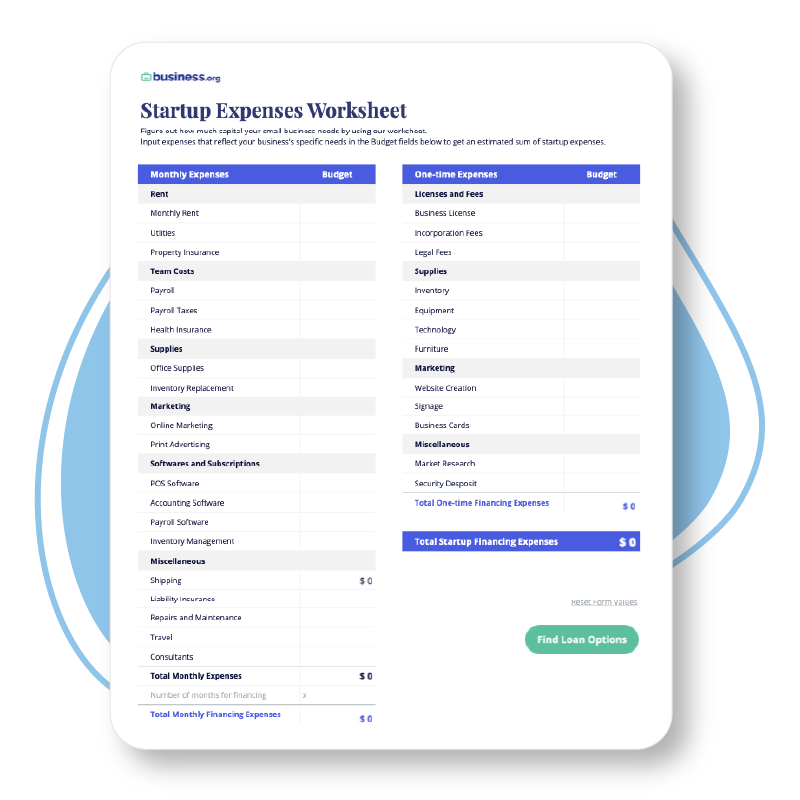
By signing up I agree to the Terms of Use and Privacy Policy .
LivePlan: Best overall business plan software
Data as of 3 /13/23 . Offers and availability may vary by location and are subject to change. *With annual billing
LivePlan has been our favorite business plan software for a while now, despite the stiff competition.
There’s a lot to like about LivePlan. It has pretty much all the features you could want from your business plan software. LivePlan gives you step-by-step instructions for writing your plan, helps you create financial reports, lets you compare your business’s actual financials to your plan’s goals, and much more. And if you ever need inspiration, it includes hundreds of sample business plans that can guide your writing.
LivePlan software pricing
| $12.00/mo. | $15.00/mo. | ||
| $24.00/mo. | $30.00/mo. |
But the best part? You get all that (and more) at a very competitive price. (You can choose from annual, six-month, or monthly billing.) While LivePlan isn’t quite the cheapest business plan builder out there, it’s not too far off either. And if comes with a 60-day money back guarantee. So there’s no risk in trying LivePlan out for yourself.
With a great balance of features and cost, LivePlan offers the best business plan solution for most businesses.
BizPlanBuilder: Most user-friendly
Need something easy to use? BizPlanBuilder fits the bill.
BizPlanBuilder doesn’t have a flashy, modern user interface―but it does have a very clear, intuitive one. You’ll be able to see your plan’s overall structure at a glance, so you can quickly navigate from your title page to your market trend section to that paragraph on your core values. And as you write, you’ll use a text editor that looks a whole lot like the word processing programs you’re already familiar with.
BizPlanBuilder software pricing
| $20.75/mo. | $29.00/mo. | $349.00 |
|---|
Data effective 3/13/23. At publishing time, amounts, rates, and requirements are current but are subject to change. Offers may not be available in all areas.
BizPlanBuilder also offers lots of helpful guidance for actually writing your plan. It gives you pre-written text, in which you just have to fill in relevant details. It offers explanations for what information you need to include in each section of your plan and way. It even gives you helpful tips from experts, so you’ll have all the information you need to plan like a pro.
So if you want planning software with almost no learning curve, you’ll like BizPlanBuilder.
Wise Business Plans: Best professional service
- Custom quote
Unlike all the other companies on this list, Wise Business Plans doesn’t offer software. Instead, it offers professional business plan writing services―meaning someone does all the hard work for you.
Now, you might think that sounds expensive―and you’re probably right (you have to request a custom quote for your plan). But there’s a lot to be said for expertise, and Wise Business Plans has plenty of that. Your business plan will get written by an experienced writer (with an MBA, no less). They’ll get information from you, do their own research, and then write your plan. You get one free revision, and you can always pay for more.
Wise Business Plans service pricing
| N/A | N/A | Custom quote |
|---|
Your end result will be a polished, entirely original business plan. (You can even get printed copies.) And best of all, you won’t have to spend your precious time working on the plan yourself. Wise Business Plans takes care of all the hard parts, and makes your business look good while doing it. Sounds like a service worth paying for, right?
Put simply, if you want the most professional business plan possible, we recommend using Wise Business Plans’s writing service.
Business Sorter: Best for internal plans
Many businesses need plans to show to people outside the company (to get financing, for example). But what if you just need a plan for internal use? In that case, we suggest Business Sorter.
Business Sorter uses a unique card-based method to help you craft the perfect business plan. (You can watch a demo video to see how it works.) You’ll plan some of the usual things, like finances and marketing. But Business Sorter also lets you make plans for specific teams and team members. It also emphasizes more internal matters, like operations, that might get overlooked in a business plan for outsiders.
Business Sorter software pricing
| $10.00/mo. | $80.00/yr. | ||
| $30.00/mo. | $240.00/yr. | ||
| $80.00/mo. | $640.00/yr. | ||
| Custom pricing | Custom pricing |
After you’ve made your business plan, Business Sorter also helps you stay accountable to it. You can create tasks, give them deadlines, and assign them to team members―giving you basic project management tools to make sure your business plans become business actions. (Oh, and did we mention that Business Sorter has the lowest starting prices of any software on this list?)
It all adds up to a business plan software that works great for internal planning.
GoSmallBiz: Most extra features
Want to get way more than just business planning software? Then you probably want GoSmallBiz.
See, GoSmallBiz offers business plan software as part of its service―but it’s just one part of a much bigger whole. You also get everything from discounts on legal services to a website builder to a CRM (customer relationship manager) to business document templates. And more. In other words, you get just about everything you need to get your startup off the ground.
GoSmallBiz software pricing
| $39.00/mo. | ||
| $49.00/mo. | ||
| $199.00/mo. |
Don’t worry though―you still get all the business planning help you need. GoSmallBiz gives you business plan templates, step-by-step instructions, and the ability to create financial projections. And if you get stuck, GoSmallBiz will put you in touch with experts who can offer advice.
If you want business planning and much, much more, give GoSmallBiz a try.
- PlanGuru : Best financial forecasting
- EnLoop : Cheapest tool for startups
We recommend the software above for most business planning needs. Some businesses, though, might be interested in these more specialized planning software.
Honorable mention software pricing
| $899.00/yr. | $99.00/mo. | N/A | ||
| $11.00/mo. | $19.95/mo. | N/A |
PlanGuru: Best financial forecasting features

PlanGuru is pretty pricey compared to our other picks, but you might find its forecasting features worth paying for. It has more forecasting methods than other software (over 20) plus it lets you forecast up to 10 years.
EnLoop: Cheapest tool for startups

EnLoop doesn’t have our favorite features or interface, but it does have really, really low pricing plus a seven-day free trial. It's the most affordable software for startup business planning and still provides all the essential features like financial analysis, team collaboration, charting, and more.
Data as of 3 /13/23 . Offers and availability may vary by location and are subject to change. * With annual billing
Several of our previous favorite planning software, including BusinessPlanPro and StratPad, seem to have gone out of business.
A business plan is a written, living document that tells the story of your business and what you plan to do with it. It serves as the source of truth for you—the business owner—as well as potential partners, employees, and investors, but it also serves as a roadmap of what you want your business to be.
Why you need a business plan
While some small-business owners don’t see the point of creating a formal business plan, it can have some concrete benefits for your business. For example, one 2016 study found that business owners with written plans are more successful than those that don’t. 1
Still too vague? Then let’s get specific.
If you ever seek business funding (from, say, banks, angel investors , or venture capitalists ), you’ll have to prove that your business deserves the money you want. A formal business plan―complete with financial data and projections―gives you a professional document you can use to make your case. (In fact, most potential investors will expect you to have a business plan ready.)
Even if you’re not seeking funding right now, a business plan can help your business. A formal plan can guide your business’s direction and decision making. It can keep your business accountable (by, for example, seeing if your business meets the financial projections you included). And a formal plan offers a great way to make sure your team stays on the same page.
What to include in your business plan
Not all business plans are created equal. To make a really useful business plan, you’ll want to include a number of elements:
- Basic information about your business
- Your products/services
- Market and industry analysis
- What makes your business competitive
- Strategies and upcoming plans
- Your team (and your team’s background)
- Current financial status
- Financial and market projections
- Executive summary
Of course, you can include more or fewer elements―whatever makes sense for your business. Just make sure your business plan is comprehensive (but not overwhelming).
How business plan software can help
With so many elements to include, business plan creation can take a while. Business plan software tries to speed things up.
Most business plan software will include prompts for each section. In some cases, you can just fill in your business’s specific information, and the software will write the text for you. In other cases, the software will give you specific guidance and examples, helping you write the text yourself.
Plus, business plan software can help you stay organized. You’ll usually get intuitive menus that let you quickly flip through sections. So rather than endlessly scrolling through a long document in a word processor, you can quickly find your way around your plan. Some software even lets you drag and drop sections to reorganize your plan.
Sounds way easier than just staring at a blank page and trying to start from scratch, right?
Choosing business plan software
To find the right business plan builder for your business, you’ll want to compare features. For example, would you rather write your own text, getting prompts and advice from your software? Or would you rather go with a fill-in-the-blank method?
Likewise, think about the elements you need. If your plan will have a heavy focus on finances, you’ll want to choose business plan software with robust financial projection features. If you care more about market and competitor analysis, look for software that can help with that research.
You may also want to find business plan software that integrates with your business accounting software . Some plan builders will import data from Xero, QuickBooks, etc. to quickly generate your financial data and projections.
And of course, you’ll want to compare prices. After all, you always want to end up with software that fits your business budget.
The right business plan software can make your life easier. With LivePlan ’s wide breadth of features and online learning tools, you can’t go wrong. Plus, BizPlanBuilder 's one-time pricing makes it easy to invest while Business Sorter has a low starting cost. And if you're business is looking to grow, GoSmallBiz and Wise Business Plans will scale with you.
But of course, different companies have different needs. So shop around until you find the software that’s best for you and your business.
Now that you've got a business plan, take a look at our checklist for starting a small business. It can help you make sure you have everything else you need to get your startup off to a good start!
Related content
- 7 Steps to Build a Successful Project Management Sales Plan
- Best Project Management Software and Tools in 2023
- 4 Cost Management Techniques for Small Businesses
Creating a business plan can take anywhere from a couple hours to several weeks. Your timeline will depend on things like the elements you choose to include, whether you use software or hire a writing service, and how much research goes into your plan.
That said, much of the business plan software out there brags that it can help you create a fairly detailed plan in a few hours. So if you’re going the software route, that can help you set your expectations.
If you want to get the most out of your business plan, you should update it on a regular basis―at least annually. That way, you can continually refer to it to inform your company’s strategies and direction.
At the very least, you should update your business plan before you start looking for a new round of funding (whether that’s with investors or lenders).
Thanks to business plan software, you can easily write your own business plan rather than pay someone to do it for you. And in most cases, software will cost you less than a professional business plan service.
There are some times you might want to go with a service though. If time is tight, you might find that it’s worth the cost of a service. Or if you’ve got big investor meetings on the horizon, you might want the expertise and polish that a professional service can offer.
Ultimately, you’ll have to decide for yourself whether business plan software or a business plan service will work better for your company.
Methodology
We ranked business plan software and tools based on features, pricing and plans, and connections to project management and other services. The value of each plan and service, along with what it offers, was a big consideration in our rankings, and we looked to see if what was offered was useful to small businesses or just extra. The final thing we looked at was the ease of use of the software to see if it's too complex for small businesses.
At Business.org, our research is meant to offer general product and service recommendations. We don't guarantee that our suggestions will work best for each individual or business, so consider your unique needs when choosing products and services.
Sources 1. Harvard Business Review, “ Research: Writing a Business Plan Makes Your Startup More Likely to Succeed .” Accessed March 13, 2023.

5202 W Douglas Corrigan Way Salt Lake City, UT 84116
Accounting & Payroll
Point of Sale
Payment Processing
Inventory Management
Human Resources
Other Services
Best Small Business Loans
Best Inventory Management Software
Best Small Business Accounting Software
Best Payroll Software
Best Mobile Credit Card Readers
Best POS Systems
Best Tax Software
Stay updated on the latest products and services anytime anywhere.
By signing up, you agree to our Terms of Use and Privacy Policy .
Disclaimer: The information featured in this article is based on our best estimates of pricing, package details, contract stipulations, and service available at the time of writing. All information is subject to change. Pricing will vary based on various factors, including, but not limited to, the customer’s location, package chosen, added features and equipment, the purchaser’s credit score, etc. For the most accurate information, please ask your customer service representative. Clarify all fees and contract details before signing a contract or finalizing your purchase.
Our mission is to help consumers make informed purchase decisions. While we strive to keep our reviews as unbiased as possible, we do receive affiliate compensation through some of our links. This can affect which services appear on our site and where we rank them. Our affiliate compensation allows us to maintain an ad-free website and provide a free service to our readers. For more information, please see our Privacy Policy Page . |
© Business.org 2024 All Rights Reserved.
10 Best Business Plan Software for Startups (2024)
Access our list of top business plan tools. Learn about the benefits of business plan software, what types there are, pricing, reviews, and what sets each apart.

Dmytro Sokhach
8 minute read

A well written business plan can be the difference between success and failure. If you want your startup to succeed then the best thing you can do is write a detailed business plan that shows where you’re headed and your vision of how to get there.
There are so many tools available that it can make your head spin. It also makes it hard work to find the best business plan tool for your exact needs.
My goal for this post is to walk you through what to consider when choosing the best business plan software for your needs , and inform you about the benefits of using startup business plan software of each type.
I’ll help you narrow down your search by sharing with you my list of 10 best business plan software for startups and small businesses , so you can get started right away!
Types of business plan software
The main types of business planning tools differ mainly in the technology used to run the software. Some tools run directly on your computer (locally) and others run on a cloud platform.
These differences may define the pricing model. Local apps tend to be one-off purchases, and cloud-based SaaS products tend to be subscription-based.
It may also have implications on the processing power. Cloud platforms depend on your internet bandwidth, and local apps will depend on your computer's CPU.
Some services, such as BizPlanBuilder, offer mixed solutions that combine cloud-based software and a Windows application. This option usually gives you the best of both worlds.
- Cloud-based software
- Windows (local) application
- A mix of cloud and local software
Why do I need business plan software?
The benefits of using business plan software are improved workflow and better outcome. But there are many small but valuable benefits when creating your startup business plan with a specialized software, rather than using Word, Google Docs, or PowerPoint.
- Modeling convenience. A bespoke software for planning and financial forecasting allows you to create and customize business regulations and quickly update the hierarchy of processes;
- Ability to process a large amount of data. When the company expands, there is no compulsion to modify or copy large amounts of data manually;
- The calculation and modification of data in real-time. The changes made are immediately transferred to all connected plans. Thus, it is possible to have all the information about the company's activities at any time: reporting on profits and losses, the most accurate forecast of financial flows, etc.
With the right business planner tool you'll be able to cut the time you spend on starting your online business .
That's what Evisa Express claims to do. Not only do they promise to save their customers 85% of their time, they also reduce their working hours.
There are many options of such software specifically for startups. They contain all the necessary functions to easily create, customize, and update your business plan.
What to consider when choosing business plan software
Below are the most important business planning software features you should keep an eye for:
- Financial forecasts. This is a handy tool for generating a detailed financial forecast for investors based on information about your current and projected sales. It can be integrated into your existing accounting software , which is beneficial for aspiring business owners;
- Detailed reporting. This tool will help create an attractive report for investors and lenders;
- Presentation creation . You won't need to spend money on additional software to create a nifty and compelling business plan presentation for your investors;
- Business tips. Many services offer online tutorials and provide detailed step-by-step instructions on how to write a business plan. Beginners can also benefit from advice on running a business from professionals.
The software you choose should have a function of customization. Even if you're using a ready-made business plan template , with its help, the business plan is easy to update, as well as adjust to the needs of your particular company.
Best 10 business plan software for startups
Jump ahead to page section:
Take a look at our breakdown of each tool on the list below to find the software with the proper set of capabilities and features for your circumstances.
1. Storydoc
Storydoc is a business plan creator designed to help entrepreneurs and businesses create outstanding and innovative business plans as well as other types of presentations.
With an intuitive interface and a wide range of features, Storydoc makes it easy to organize and present your business roadmap, executive summary, go to market (GTM), competitors, financials, SWOT, and other aspects of your plan in a clear and concise manner.
What sets Storydoc apart is the fact it gives you ready-made interactive slide templates that are scientifically proven to bring high engagement, grab and hold attention, and let you guide viewers and readers to the next step.

- Intuitive and user-friendly interface;
- Templates that have been optimized for engagement;
- Robust integrations with your existing tech stack;
- The ability to pull company branding directly from your website;
- Extensive analytics panel where you can track the performance of your business plan.
Possible disadvantages include a lack of collaboration tools so that multiple users could work on the business plan together.
Some advantages would be the gallery of business plan templates and the extensive library of other critical business documents such as one-pager templates , sales deck templates , and proposal templates .
Pricing plan options:
- Starter ($40/month per user)
- Pro ($60/month per user)
- and custom Team plans with pricing available upon request.
*You can also save money with annual billing.
2 . LivePlan.com
LivePlan is software with an intuitive interface and plenty of ready-made templates. It’s useful for startups. With its help, you can easily create a one-page business strategy and then add any optional features you need.
The service contains more than 500 ready-made industry business plan templates approved by the SBA.
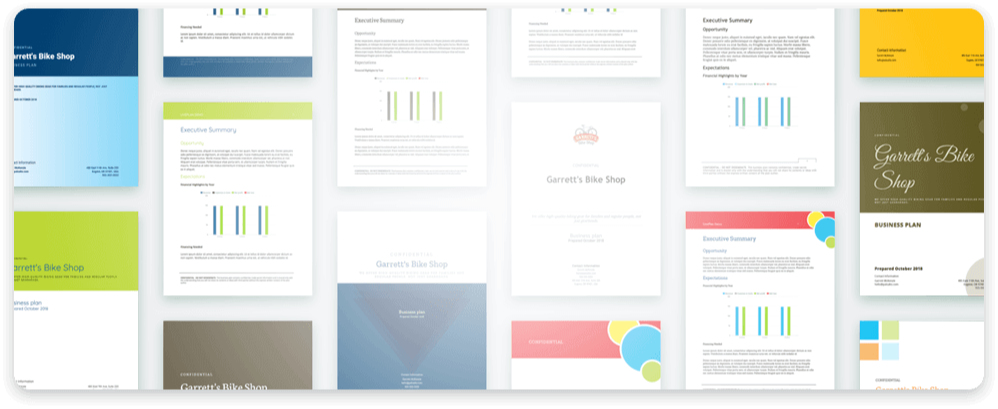
Source: Liveplan.com
It has some useful tools:
- A virtual training center for startup owners;
- Ability to integrate already installed financial software;
- Real-time financial data tracking;
- Performance tracking by various parameters;
- Integration with Xero and QuickBooks Online services available;
- Export of the complete business plan to Word or PDF is enabled.
Possible disadvantages of this software for novice entrepreneurs are limited opportunities to integrate other tools and difficulty to create your own financial modeling projections.
- Annual ($15 per month, paid once a year);
- Six months ($15 per month);
- Pay As You Use ($20 per month, paid monthly).
*LivePlan does not offer any long-term contracts. A 60-day free demo period is available.
A possible disadvantage of the service for beginners is the complicated algorithm of financial software integration and limited opportunity for financial modeling.
3. BizPlan.com
BizPlan is a universal business plan builder with the additional feature of connecting to all the tools of the Startups.com network.
Perfect for startups that are based on raising investments. It lets you divide the entire scope of work into steps and then track progress using the built-in Progress Tracker tool.
It is a step-by-step builder with the ability to use all the tools of the Startups.com service after the initial subscription. A large amount of data can be divided into stages for convenience and then tracked with the Progress Tracker tool.
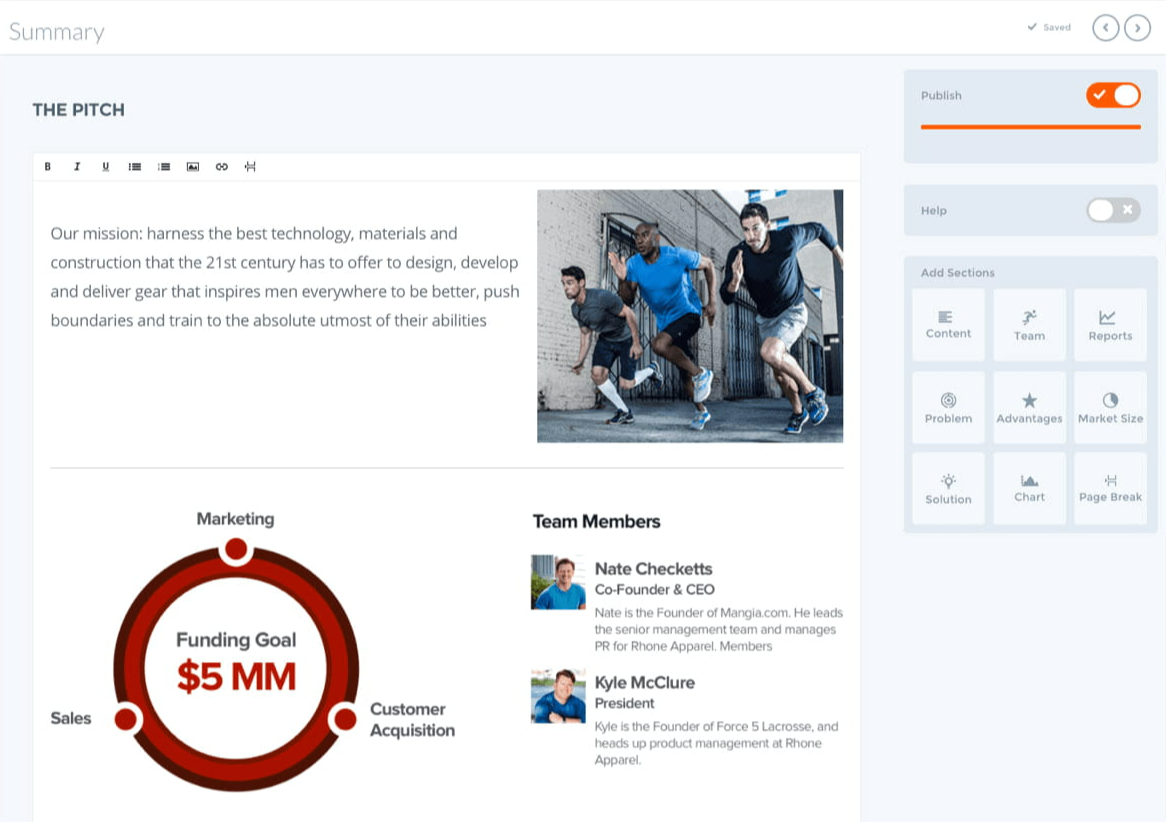
Source: BizPlan.com
- Possibility of issuing lifetime access to the service;
- Connectivity to Findable is available. This is important for companies that are interested in attracting financial investment;
- There are many online educational programs for entrepreneurs;
- Multiple owners can be connected to one account.
The possible disadvantages are the lack of a free version and the absence of a mobile version. Also, there are no industry templates for creating a business plan.
- Monthly plan ($29 per month)
- Annual plan ($20.75 per month or $249/year)
- Lifetime access (one-time fee of $349)
4. Upmetrics.co
Upmetrics is a handy builder with additional features for strategic planning. The cloud-based software simplifies the complex work of creating a business plan.
This includes handy worksheet tools and built-in templates to customize your plan or forecast for your specific needs.
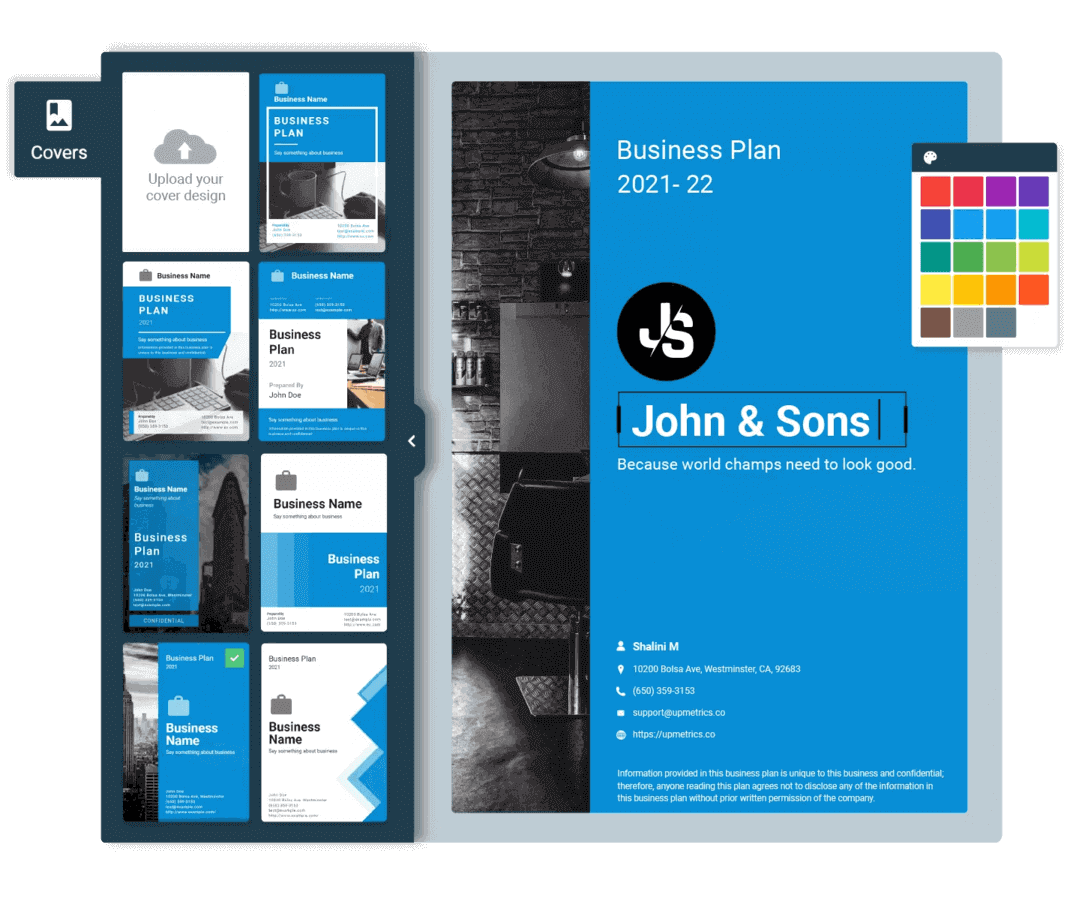
Source: Upmetrics
- A wide choice of customized templates;
- Compatibility with social networks;
- Adjustable activity panel;
- Financial forecasting function.
- Individual plan ($9 per person/ month)
- Team plan ($14 per month)
- Premium plan ( $49 per month)
*They do not offer a free trial version.
5. Enloop.com
Enloop is a turnkey solution for creating business plans for investors, banks, and lenders. This is a cloud-based software with writing and text synchronization features.

Source: Enloop.com
- You can make 1 free business plan;
- There is a completely free version for testing the solution;
- It is available in several languages;
- Interactive PDF is available.
- Basic ($9 per person per month)
- Advanced ($11 to $20 per month)
- Professional ($24 to $40 per month)
6. GoSmallBiz.com
GoSmallBiz is an online support system specifically for small businesses and startups. An important nuance is that this software only works in the United States. There are online business training tutorials for aspiring entrepreneurs.
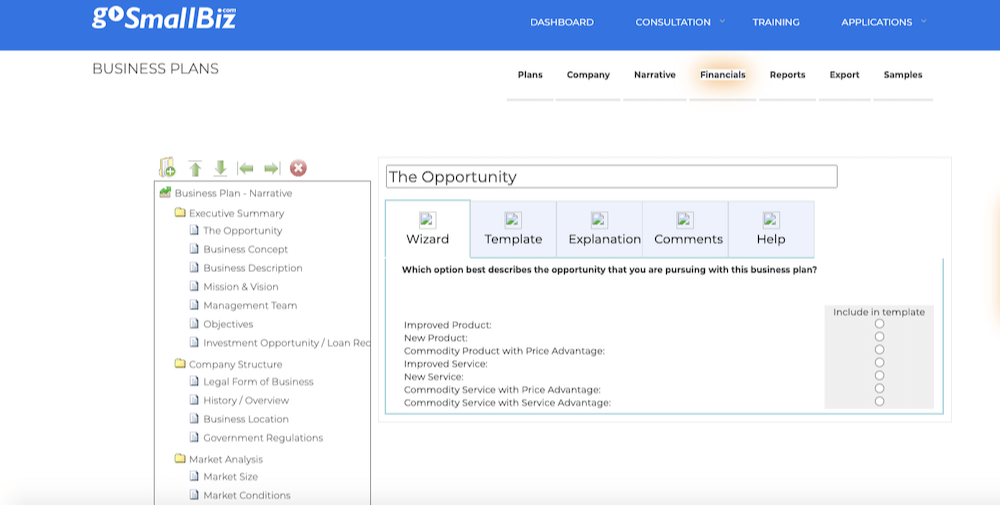
Source: GoSmallBiz
- Access to up-to-date management information for decision-making;
- Unlimited access to an online consultant;
- There is access to the database to collect current information and attract customers.
Possible disadvantages are a limited number of templates and sync available only with Microsoft Word or PDF.
- Monthly fee of $39
7. Business Sorter
Business Sorter is a handy constructor for creating internal business plans. It is suitable for entrepreneurs who don't need a presentation to attract investors.
This cloud-based software has ready-made solutions for all key areas of business planning: brand building, financial planning, sales, and more.
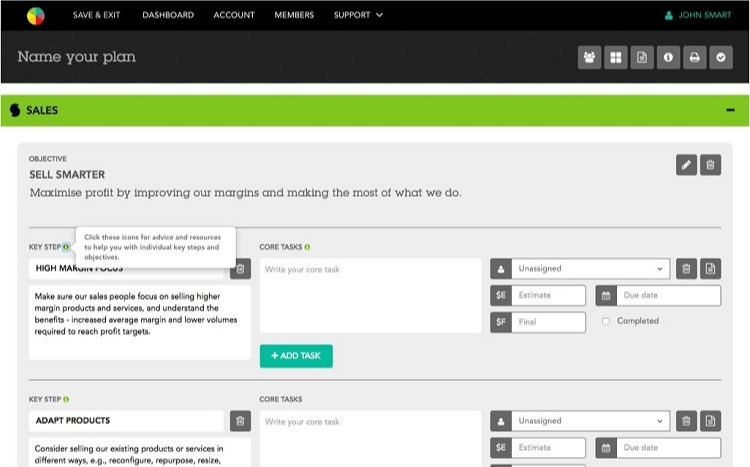
Source: businesssorter.com
- Card system with 173 digital cards;
- An unlimited number of team members can be added, tasked, and monitored;
- Access from multiple devices is possible;
- There is a built-in help function;
- Strong data protection.
Possible disadvantages are a small number of financial planning tools and educational materials presented only in Microsoft Word and PDF format.
The cost depends on the number of users. There is a special offer for companies with an unlimited number of team members.
8. iPlanner
iPlanner is a multifunctional platform for business planning. It can also be used for project management. This solution contains ready-made business plan templates for different startup options: restaurant, enterprise, venture capital project, and others.
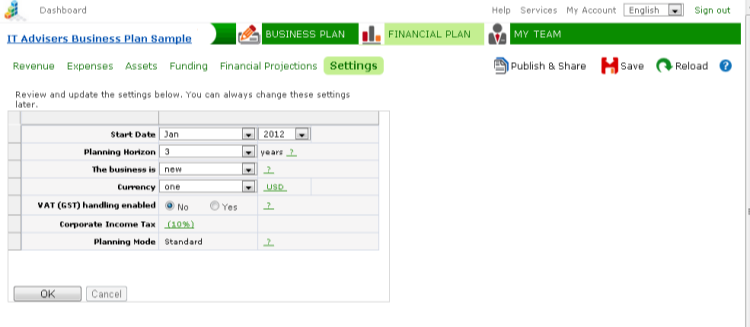
Source: iPlanner
- Business plan creation wizard with step-by-step instructions;
- Several tools for creating financial forecasts;
- Integration with Microsoft Office and DropBox;
- Training content library with practical recommendations for creating a business;
- Support of an experienced mentor.
- All users can back up their data to the cloud storage.
- Professional Plan (supports 1 project, $55)
- Corporate Plan (supports 12 projects, $93)
- Corporate Plus (the price is set individually)
*They do not have a payment plan paid each month.
Cuttles is a fully interactive, cloud-based business planning software with ready-made templates. Developers have emphasized planning and the ability to manage budgets and make financial forecasts.
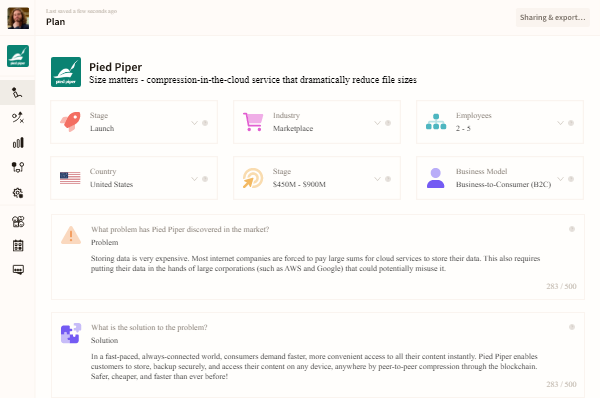
Source: cuttles.io
- A template for creating a one-page business plan for banks, investors, and lenders;
- The cloud service provides a high level of security;
- There is a convenient business plan export to PDF;
- Support is available in 6 languages: English, French, Spanish, German, Danish, and Portuguese;
- There is a free version for 14 days.
Cuttles offers online training for startup owners: courses with video lessons and a library of tools/ useful resources.
- Seed Plan (one startup and one user, $8/year)
- Grow Plan (one startup, unlimited users, $16/year)
- Series Plan (unlimited startups and users, $48/year)
10. MAUS Master Plan Lean
MAUS is a business plan creation software created in Australia. Perfect for startup creators who want to move into strategic planning.
The service has everything for that: a business plan creation wizard with step-by-step instructions, tools for 5-year financial projections, and financial reports for budget planning.
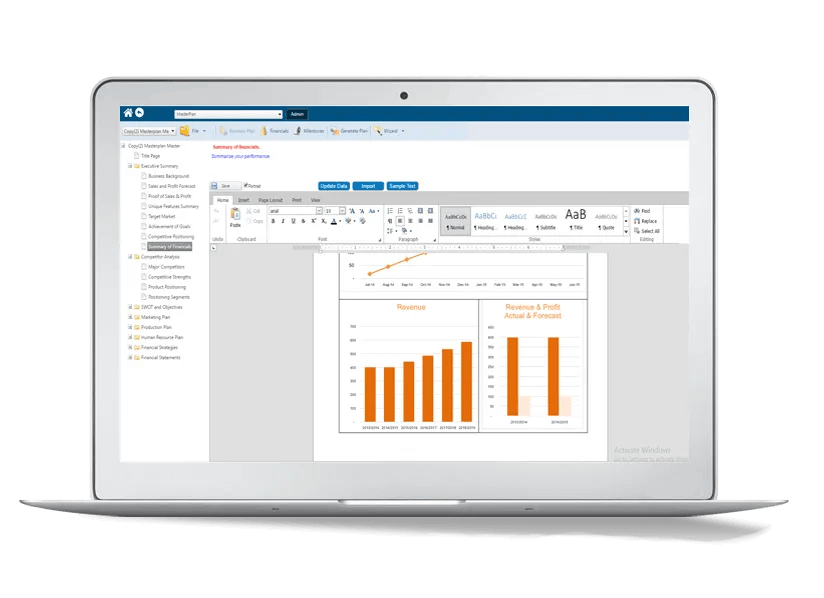
Source: MAUS
- Strategic planning wizard;
- There is a tool for creating a step-by-step action plan, building and tracking tasks for maximum productivity;
- Function for creating schedules;
- Collaboration function;
- Marketing reports can be generated, and performance can be tracked in real time.
MAUS Master Plan has no free version, which can be a problem for small business owners and startup creators.
- Business planning & HR Pack ($97 per month)
- MasterPlan Learn ($299 per year)
- Business Planning Pack ($499 per year)
I hope that this list has helped you move forward with confidence to grow your business fast and effectively. Best of luck!
Found this post useful?
Subscribe to our monthly newsletter.
Get notified as more awesome content goes live.
(No spam, no ads, opt-out whenever)
You've just joined an elite group of people that make the top performing 1% of sales and marketing collateral.
Dmytro Sokhach is an entrepreneur and the 6-Figure Flipper Club member. Founded Admix Global (web agency) that builds websites, makes them profitable, and sells them as business.
How to create a Business Plan One-Pager
Business plan presentations templates that grab attention
Company Pitch Deck Examples (+ Tips & Templates)
10 Top Pitch Deck Examples to Inspire Your Fundraising
Make a business plan everyone understands
Try Storydoc for 14 day free (anything you create is yours forever)
- Credit cards
- View all credit cards
- Banking guide
- Loans guide
- Insurance guide
- Personal finance
- View all personal finance
- Small business
- Small business guide
- View all taxes
You’re our first priority. Every time.
We believe everyone should be able to make financial decisions with confidence. And while our site doesn’t feature every company or financial product available on the market, we’re proud that the guidance we offer, the information we provide and the tools we create are objective, independent, straightforward — and free.
So how do we make money? Our partners compensate us. This may influence which products we review and write about (and where those products appear on the site), but it in no way affects our recommendations or advice, which are grounded in thousands of hours of research. Our partners cannot pay us to guarantee favorable reviews of their products or services. Here is a list of our partners .
5 Best Business Plan Software in 2022

Sally Lauckner is an editor on NerdWallet's small-business team. She has over 15 years of experience in print and online journalism. Before joining NerdWallet in 2020, Sally was the editorial director at Fundera, where she built and led a team focused on small-business content and specializing in business financing. Her prior experience includes two years as a senior editor at SmartAsset, where she edited a wide range of personal finance content, and five years at the AOL Huffington Post Media Group, where she held a variety of editorial roles. She is based in New York City.
Robert Beaupre leads the SMB team at NerdWallet. He has covered financial topics as an editor for more than a decade. Before joining NerdWallet, he served as senior editorial manager of QuinStreet's insurance sites and managing editor of Insure.com. In addition, he served as an online media manager for the University of Nevada, Reno.

Many, or all, of the products featured on this page are from our advertising partners who compensate us when you take certain actions on our website or click to take an action on their website. However, this does not influence our evaluations. Our opinions are our own. Here is a list of our partners and here's how we make money .
When you’re starting a business, developing a strong business plan will be one of the first steps you take. Your business plan will cover everything from a detailed explanation of your products or services and pricing model to at least three years of financial projections—plus much more. Therefore, whether you’re not sure how to get started or you’re just looking to make the process easier, you may want to turn to business plan software for help.
In this guide, we'll break down five of the best business plan software options—discussing their pros, cons, features, pricing, and more—so you have all the information you need to decide which solution is right for your small business.
Looking for tools to help grow your business?
Tell us where you're at in your business journey, and we'll direct you to the experience that fits.
on NerdWallet's secure site
The 5 best business plan software options
The right business plan software will make the process of writing your business plan much simpler. Like many business software solutions, however, there are a number of different business plan software options out there—each of which has a unique set of features, user experience, and price.
This being said, if you're looking for a place to start your search for the best business plan software, you can explore the five top options below:
How much do you need?
with Fundera by NerdWallet
We’ll start with a brief questionnaire to better understand the unique needs of your business.
Once we uncover your personalized matches, our team will consult you on the process moving forward.
1. LivePlan
Best overall business plan software.
If you want template-rich, modern-feeling business plan software, then LivePlan may be the right pick for you. LivePlan excels with their user interface, which feels updated and slick, and also offers intuitive, easy-to-use features and options.
Their step-by-step instruction will help you kick things off from the beginning, and you can take advantage of their online learning center to continue to gain business skills.
Affordable plans, including pay-as-you-go option
No long-term contracts or cancellation fee; 60-day money-back guarantee
Modern, intuitive interface; cloud-based, can be used on Mac, PC, as well as tablets
Ability to create unlimited plans in one account; over 500 customizable templates
Variety of business resources including video tutorials, step-by-step instruction, and general customer support
Limited integration options
Challenging to enter your own financial modeling projections
Can be difficult to learn
Ability to create an unlimited number of business plans on one account
More than 500 business plan templates spanning various industries
Integration with Xero and QuickBooks Online
Real-time tracking of financial data with accounting integrations
Ability to export your business plan to Word or PDF
Expert advice and step-by-step instruction included
Performance dashboards for tracking against budgets and sales goals
Ability to create and export a one-page pitch executive summary
Annual plan: $15 per month, billed every 12 months
Six-month plan: $18 per month, billed every six months
Pay-as-you-go plan: $20 per month, billed once every month
2. GoSmallBiz
Best for multiple business management tools in one platform.
Next on our list of the best business plan software options is GoSmallBiz, which is much more than just a business plan software. With GoSmallBiz, you have access to business continuity planning software with features that cover creating a roadmap, working through business and legal forms, building a website, and more.
In this way, GoSmallBiz is great for startups or newer businesses looking to access multiple business management tools through one platform.
Unlimited business consultation and extensive library of online resources
Multiple business tools in one software
Website consultation analysis and business assessment
Industry-specific business plan templates with emphasis on financial projections and statements
Expensive monthly cost compared to alternatives
Limited business plan features
Entire business plan can only be exported to Microsoft Word
Outdated interface
Industry-specific business plan templates with step-by-step building wizard
Ability to create financial statements and projections
Free website hosting and website builder
Customer relationship manager with integration with MailChimp
Digital marketing dashboard with social media and Google Analytics integrations
HR document builder
Corporate minutes writer
Business documents library
Business courses library
Unlimited business consultation
$39 per month, no contracts, free cancellation
Best for simple, fast business plan creation.
If you're looking for free business plan software, Enloop will be one of your closest options—they offer an all-inclusive seven-day free trial, no credit card required. Additionally, unlike some of the other options on our list, Enloop is strictly dedicated to business plan creation, including automated text writing, financial forecast comparisons, and a real-time performance score that tracks your progress.
This being said, if you'd prefer the most straightforward, fast, and simple way to write your business plan, Enloop will be a platform worth considering.
Simple and straightforward software, solely dedicated to business plan creation
Seven-day free trial
Automatic text generation available to streamline the writing process
Affordable plans with annual discount option
Limited additional educational resources
Only one template option
No integration options
Ability to create three business plans with customizable text, images, tables, charts, and over 100 currency symbols and formats
Includes automatic text generation for each plan section that you can then customize
Automatically generated financial statements
Includes financial performance comparison analysis (using three ratios with Detailed plan and 16 with Performance plan)
Real-time performance score to track your progress
Ability to invite users to edit (two with Detailed plan, five with Performance plan)
Pass/fail report and certificate to help you identify issues with your plan
Free plan: Seven-day free trial with no credit card required
Detailed plan: $19.95 per month or $11 per month, paid annually
Performance plan: $39.95 per month, or $24 per month, paid annually
Best for startups looking to acquire funding or find investors.
Part of the Startups.com suite, Bizplan gets top marks for their user interface—it’s intuitive, easy to use, and modern. You’ll work with a step-by-step business plan builder to get exactly what you’d like from your business plan. It may remind you of a modern website builder, since it has drag-and-drop tools to build templates.
Moreover, for one subscription fee, you have access to all of the tools in the Startups.com network, including self-guided courses, how-to guides, masterclass videos, and more. All in all, with a direct connection to Fundable, Bizplan is a top business plan software option for startups looking to acquire funding and find investors.
Subscription gives you access to all Startups.com tools
Lifetime access subscription option
User-friendly drag-and-drop business plan builder
Excellent educational resources
Connection to Fundable great for businesses looking for capital
No free trial
No templates based on industry
No mobile access
Drag-and-drop templates for business plan building
Financial command center to track all business financials in one place
Unlimited account collaborators
Ability to share business plan online with investors
Online resources including self-guided courses, masterclass videos, how-to guides, mentorship access
Unlimited software use for Fundable, Launchrock, and Startups.com
Monthly plan: $29 per month
Annual plan: $20.75 per month, billed at $249 per year
Lifetime access: $349 one-time fee
5. PlanGuru
Best for financial planning and budgeting.
Finally, for some of the strongest financial features among business plan software options, including budgeting and forecasting, you might check out PlanGuru. Whereas the other solutions we've reviewed were first and foremost focused on writing a business plan, PlanGuru is dedicated to business financial planning —providing the tools you need to create budgets, financial forecasts, reports, and more.
Therefore, if you need a software solution that can streamline the financial piece of your business planning processes, PlanGuru will certainly have the most to offer.
Extensive financial tools and detailed forecasting, budgeting, and reporting capabilities
Substantial library of resources
Cloud-based and desktop options
14-day free trial and 30-day money-back guarantee
Expensive, especially for additional users
Only focuses on the financial aspect of business planning; no templates or tools for basic business plan writing
Difficult to use without prior financial knowledge
Cloud-based version of software, as well as locally installed Windows version (desktop version has a few more features)
Works with QuickBooks Online, Xero, and Excel
Budgeting and forecasting for up to 10 years
Over 20 standard forecasting methods
Formula builder to create custom methods
Ratios and KPIs
Dashboard and reporting tools
Help guides, video tutorials, knowledgebase, and live U.S.-based customer support
14-day free trial
$99 per month (additional users $29 per month)
$899 per year (additional users $299 per year)
What to look for in business plan software
Ultimately, it's up to you to decide, which, if any, of the best business plan software solutions on our list is right for your business.
So, if you're trying to figure out how to choose between the various options out there, it might be helpful to compare your top choices based on the following criteria:
Features: As we've seen different business plan software solutions offer different features. You'll want to look carefully at the feature list of any software and determine what features are most important for your business needs. Do you need an extensive library of templates with detailed customization? Would you prefer software that includes an online learning center for business skills? Are you looking for a solution that combines business plan writing with other tasks? It may be useful to list out your ideal feature set, so you can compare individual software plans to that list.
Price: Although you might be able to find some free business plan software options (or at the very least, free trials), in most cases, you'll need to pay a subscription fee to access the platform you choose. Therefore, you'll want to think about what your budget is for this business tool and what type of software is most cost-effective for your needs.
User experience: User experience can vary widely among different business plan software options. You’ll find some programs that are newer or have been recently updated. Others might have the kind of interfaces that felt new years ago but are now pretty out of date—and, subsequently, make them a little harder to use. The right user experience for your needs is genuinely a matter of opinion and comfort—nevertheless, it's worth testing thoroughly testing out a platform to ensure that it can truly work for you before investing in a monthly or annual subscription.
The bottom line
There's no doubt that properly crafting your business plan is important for the future growth and success of your small business. Luckily, the right business plan software should make the process much simpler.
This being said, whether you opt for one of the best business plan software options listed here, or another platform entirely, you'll want to take the time to compare multiple solutions and ensure you choose the one that's right for your business.
As we mentioned, it can be helpful to think about the features you're looking for, your budget, and your user-experience preferences ahead of time—that way, you'll have a set of criteria in mind as you explore different solutions.
Ultimately, perhaps the best thing you can do to find the right software is to actually test out the platforms themselves—either by using a free trial or a money-back guarantee.
This article originally appeared on JustBusiness, a subsidiary of NerdWallet.
On a similar note...

- Start free trial
Start selling with Shopify today
Start your free trial with Shopify today—then use these resources to guide you through every step of the process.

6 Best Business Plan Software Platforms (2024)
Read on for a list of our favorite software platforms for writing a business plan, plus advice on how to choose the right business plan software for your needs.

Every successful ecommerce business is supported by a foundation of solid business planning. A professional business plan sets the stage for your new business , acting as an internal and external roadmap for brand identity, financial planning, project management, and more.
Writing a business plan is an important and often difficult task for any entrepreneur or business owner. If you can't get your head around a business plan template , business planning software can help. If drafting a business plan from scratch sounds too daunting to tackle on your own, business plan software offers everything you need for business plan creation, including financial reports, sample business plans, how-to articles, and more.
Read on for a list of the best business plan software platforms, plus advice on how to choose the right business plan software for your needs.
6 best business plan software platforms for 2023
Affordable software with business plan templates and samples

- Pricing : standard plan is $15/month; premium is $30/month; annual discounts available
- Money-back guarantee : 60 days
- Capterra rating : 4.5/5
- G2 rating : 4.1/5
- Integrations : QuickBooks, Xero, open API
One of the most affordable pieces of business plan software on this list, LivePlan allows users to create unlimited business plans and offers more than 500 sample business plans and pages to start with. Get step-by-step guidance on how to write your plan and use templates for different types of business plans, making it easy to tailor your plan to your needs.
LivePlan also offers a robust set of financial forecasting tools, helping you to convert financial data like cash flow statements into easy-to-read charts and graphs.
Business plan software for entrepreneurs who struggle with writing

- Pricing : 7-day free trial; detailed plan is $19.95/month; performance plan is $39.95/month; annual discounts available
- Money-back guarantee : none, but no contracts are required
- Capterra : 4/5
- Integrations <: none
Enloop has many of the same features as other pieces of business plan software. It automatically syncs financial data and creates financial ratios. And when you write your plan, it assesses it and gives you a performance score, so you can improve it if needed. You can also add users for easy collaboration and sharing. Enloop is especially good if writing isn’t your strong suit, as you can plug in your metrics and let the software do the “writing” for you .
Business plan software for startups seeking investment

- Pricing : $29/month; $349 lifetime access; annual discounts available
- Money-back guarantee : 3 days
- Capterra : 4.4/5
- Integrations : Xero, QuickBooks
Bizplan is a business plan software that caters to small businesses and startups seeking external investment. The platform makes connecting with potential investors easy, and allows users to easily publish a business plan on Fundable, a popular crowdfunding platform.
Other standout features include drag-and-drop tools for creating business plan templates, access to self-guided business courses from Startups.com, and financial tools to help set salaries, forecast revenue, and track expenses.
Best business plan software for planning, forecasting, and scenario analysis

- Pricing : 3-day free trial available; app and desktop require separate subscriptions at $99/month each, plus $29/month per additional user; discounts available for annual billing
- Money-back guarantee : 30 days
- Capterra : 4.2/5
- Integrations : Xero, QuickBooks, Microsoft Excel
If the focus of your business plan is your business’s financial picture and potential, PlanGuru is an excellent option. In addition to offering most of the basic business plan software features you’d expect, PlanGuru offers tools for budgeting, financial forecasts and reports , strategic planning, and scenario analysis.
While PlanGuru supports additional users, each user also comes with an additional monthly fee of $29/month .
Best contract-free business plan software for new businesses

- Pricing : plans start at $15/month; Go service plan for $199/year; Guide service plan for $49/month; Grow service plan for $39/month; additional one-time services and recurring subscriptions available
- Capterra : n/a
- Integrations : MailChimp
While it may not have the longest list of business planning features, GoSmallBiz’s solution is part of a larger business continuity planning software platform that includes tools for everything from human resource management to tax payments. GoBizPlan also offers industry-specific business plan templates to kickstart your business plan creation. This is especially helpful if your business idea is destined for a specific vertical market .
GoSmallBiz users can create financial statements and projections for multiple years, including income statements , cash flow statements , and balance sheets . Finally, GoSmallBiz offers step-by-step guidance, prompts, and tutorials to help users get the most out of the platform .
Business plan software with the option to get help from professionals

- Pricing : free trial available; annual subscriptions available; PlanBuildr uses a custom pricing model; rates aren’t readily available on its website, but one landing page prices the business plan software at $3,500
- Money-back guarantee : none, but subscription may be canceled anytime within the first 30 days
- Integrations : various across accounting, CRM, and marketing tools
PlanBuildr is another user-friendly business plan software for people who aren’t as confident with the writing process. This software uses a fill-in-the-blank business plan creator to help you quickly build a simple but solid business plan. PlanBuildr also offers extensive financial reports and features, including charts and graphs and the ability to create various financial projections.
PlanBuildr has 10 business plan designs to choose from, and you can also hire PlanBuildr for additional business plan writing services .
Why use business plan software?
Entrepreneurs use business plan software to guide them through the process of turning a business idea into a complete business model. Only a select group of small business owners go into business for writing—the rest have stronger skills elsewhere. Business plan software can offer the exact support you need to get the wording, structure, and presentation just right.
Likewise, not every entrepreneur is good with numbers. Business plan software can help with financial forecasting by making sense of your cash flow and other financial data. Some software will even automatically generate financial statements for you, making it easier for you and your audience to understand the numbers.
Many business plan tools also offer a range of business plan templates . It’s almost always easier to follow a template or business plan example than to start with a blank page. Writing a business plan is a lot less intimidating this way. Plus, business plan templates can function as a checklist, ensuring that you don’t omit any important sections or information .
How to choose your business plan software
While most business planning software can accomplish the same end goal, each has its own pros and cons, depending on your needs. The best business plan software for you may be different than the best option for your fellow business owners. When shopping for business plan software, consider the following:
- Budget . Perhaps most obvious, the business plan software you choose needs to fit within your budget. Basic business plan tools may not have all the functionality you’re looking for, but more advanced features typically mean a higher price tag.
- Collaboration . If you’re collaborating on your business plan with a fellow founder, an accountant, or legal counsel, you’ll want a business plan tool that supports multiple team members. Some software also allow you to add users as viewers, which can be helpful for distributing the plan to shareholders, lenders, or potential investors, for example.
- Financial reporting . If business financials and reporting are important to you, choose business plan software that excels in this area. Look for business planning tools that offer financial forecasting features beyond basic data reporting, including marketing and performance reports and data visualization through charts and graphs. If you need more extensive financial tools, consider investing in accounting software .
- Interface . Every tool you use in your business needs to have an interface that’s easy to navigate. Choosing business planning software with a steep learning curve or difficult-to-navigate interface may make the process of creating a business plan more frustrating than it needs to be.
- Templates . One of the greatest advantages to using business plan software is access to business plan templates and examples. The best business plan software options offer a range of templates, enabling you to create business plans for multiple audiences and different contexts.
- Software integrations . If you have a tightly connected tech stack, it would behoove you to find a business plan software that can integrate seamlessly with other popular business tools, including Microsoft Office and popular platforms for marketing and accounting.
- Support. If you run into trouble with your business planning software, a great support team or library of business resources can help you get back on track. As a bonus, most business plan software providers also offer online learning tools to help you maximize your results, including video tutorials and built-in advice modules
- The Ultimate Guide To Dropshipping (2024)
- The 19 Best Dropshipping Clothing Suppliers To Grow Your Business
- What is Cash Flow Management + Template and Examples
- What Is Web Hosting? Web Hosting Definition and Guide
- How to Write a Bakery Business Plan- Your Recipe for Success
- How One Couple Raised Over 500% of Their Crowdfunding Goal on Kickstarter in 28 Days Without an Audience
- 4 Major Advantages of a Sole Proprietorship
- The 10 Best Crowdfunding Websites for Raising Capital in 2021
- What is a Vertical Market and Why Should You Care?
- How to Transition From a Kickstarter Campaign to a Successful Shopify Store
Business plan software FAQ
What is the best software to write a business plan, what are the 4 types of business plans.
- Startup business plan
- One-page business plan
- Internal business plan
- Strategic business plan
Is there a template for a business plan?
Do i need a business plan to start a small business.
Keep up with the latest from Shopify
Get free ecommerce tips, inspiration, and resources delivered directly to your inbox.
By entering your email, you agree to receive marketing emails from Shopify.
popular posts
The most intuitive, powerful
Shopify yet
Shopify Editions Summer ’24

Subscribe to our blog and get free ecommerce tips, inspiration, and resources delivered directly to your inbox.
Unsubscribe anytime. By entering your email, you agree to receive marketing emails from Shopify.
Latest from Shopify
Jul 10, 2024
Jul 9, 2024
Jul 8, 2024
Jul 6, 2024
Jul 5, 2024
Learn on the go. Try Shopify for free, and explore all the tools you need to start, run, and grow your business.
Try Shopify for free, no credit card required.
#1 Business Plan Software for Early-Stage Startups
Cuttles is a fully interactive and guided business plan software that helps entrepreneurs build, understand and grow their business.
Get ready to meet investors with confidence
Our web app has all the features and in-app guides you need to create a startup pitch, write a business plan, define a startup team, do budgets and financial projections. It’s simpler, faster and more impactful than ever to start a business.
Trusted and used by startup teams at
Join our Cuttles Perks program and save up to $500.000 on startup tools.
We've partnered up with the greatest SaaS giants to give you the best possible startup deals & tools to kickoff your startup journey
More than 30.000 entrepreneurs grow their startups using Cuttles
Read what some of our happy customers have to say
When you’re building a startup there are lots of things you need to figure out and keeping your plan and investor material clearly defined shouldn’t be an extra task to keep you away from building a great product. While it's a sinuous task to write a business plan, Cuttles makes the process of thinking, sketching and writing your business plan seamless. We were able to get our plan ready in a couple of days easily and without issues.

We’ve been missing a tool like Cuttles for years! All our work is usually stuck within folders, within other folders and it’s hard to have a one-stop-shop with all the details of each of our startups. Plus, these changes almost come on a weekly basis! So having an always up-to-date link to the BP is such a nice feature. No more little hacks and workarounds, now business ideas have a home of their own!
Creating something from nothing is hard. Building a startup requires a huge amount of work and that's where Cuttles helps. The versatile and well-organized startup builder is a solution to many of the problems that founders face day by day. It is a must-have tool for every entrepreneur, and especially those in the early-stages.
Cuttles has so amazing UX and design that I immediately felt like I had help. There were prompts and tasks given to make me think critically about my startup business. And it felt fun without being childish. If you are just starting your business and aren't an MBA try Cuttles. It's easy to use and comes with high-quality exportable templates
The Cuttles team and their first-hand experience of successful start-ups and working with aspiring entrepreneurs has manage to built an amazing startup plan software. The Canvas forces one to succinctly summarise one’s business pitch, the Budget tool provides a powerful but easy to use interface to construct a detailed budget that includes cash flow projections and metrics that investors will require. The Business Plan follows the same ethos of stepwise guidance. A set of task that we thought would take months to complete were shortened to a few weeks. Cuttles is a wonderful resource that we would unequivocally recommend.
Finally business plan software with great UX and a painless process - 10/10 will always recommend! Absolutely love it. The guide will help you in every aspect of your plan, this was such a huge help for us! I've tried most apps out there including LivePlan, Bizplan, and Upmetrics, and found them all either frustrating or missing something critical. The Cuttles web app simplifies the tedious task of thinking what to write in a business plan, a pitch deck, and more. It comes with a great examples, super helpful tips, and very and documentation.
Cuttles is on a mission to help startups and SMEs succeed by providing them the tools needed for a smoother startup journey. That's pretty cool! Starting a company, hiring your team and closing funding should be easy, so startups can focus their energy on what's really important; innovation and growth. Together with Cuttles, we can help startups accelerate their growth and relevance in the market.
Building a business is hard work and you need digital solutions that can make everyday life easier as an early-stage founder. Cuttles is a guided and personalized startup builder that helps you with planning, budgeting, and presenting your startup to investors. Their business plan tool helps you write your plan in a fraction of the time. That’s why we’re so proud to partner with a cool SaaS startup planning tool like Cuttles . We share the same goal – to help you!
Trusted and mentioned by
Hi everyone.
I'm Christian, CEO here at Cuttles.
There are few things as rewarding as building your own business. It's fun, challenging, and can create a deep sense of meaning and purpose, which, these days, most of us desperately desire. But knowing where to begin and how to move forward can be tough.
We may have a dream and see the big picture, but where do we go from there?
A recent finding shows that 63% of people in their twenties would like to start their own business and are drawn to experience life as entrepreneurs. Most, however, never get any further. It’s hard to know precisely how to go about it, and for that reason most aspiring entrepreneurs never dare take the first plunge. This doesn’t come as a big surprise. Building a business is a high-risk mission and there’s no certainty it will work out in the end. All we really have to rely on is our motivation and our willingness to do the work.
For early-stage founders, that work includes business planning. After all, an idea is, well - just an idea. It is how you execute that idea that will define your outcome and create a business.
So, what do you think when I say business planning? Let’s face it. For most of us, business planning kind of sucks. Who wants to sit around and write a plan when you could be building, marketing, selling?
But what if I told you that 90% of startups fail and that 56% do so because of poor business planning – or no planning at all?
It’s not the act of writing a business plan that does the trick, it’s the work you do in the process. Doing the research, understanding the problem you’re trying to solve and empathizing with the people you solve it for. It's the making sure your business and your business model are well thought out, assessing the risks, and through that becoming more sure that your idea is worth pursuing and using it to build a product and a startup that your customers won’t just like, but that they need.
However, the urgency of planning your startup, doesn’t take away the tediousness and time it takes.
That’s why we built Cuttles. We want to change business planning for good, by making it simple and easy to start, build and grow your business. By removing the hassle of business planning for you, we create time and space for you to do what you do best: Create lasting change for your customers. And although we’re not quite there yet, we work tirelessly to revolutionize business planning to make it simple, fast, and fun to plan and share your startup and get the funding you need to grow.
Get startup smart in our academy
We’re not just a powerful business plan app and great startup deals. We also want to train, inspire and empower startups to create more game changing solutions.
Top Courses
Top resources.

10 Best Business Plan Software and Tools for Better Productivity
Fast fact: 70% of businesses that survive for 5 years follow a strategic business plan.
That makes having a comprehensive and compelling business plan a no-brainer for long-term business growth. It serves as a roadmap for your venture and demonstrates your vision, strategy, and potential to investors and stakeholders.
However, drafting a business plan from scratch can take time and effort, especially for those with limited experience and resources. Fortunately, many excellent business plan software solutions are available to make the process easier.
This article covers the top 10 business plan software options available in 2024. Each offers unique features, pricing structures, and capabilities to cater to diverse business needs.
Let’s get right in!
10 Best Business Plan Software for 2024
1. Upmetrics 2. LivePlan 3. Enloop 4. BizPlan 5. GoSmallBiz 6. Business Sorter 7. iPlanner 8. Cuttles 9. MAUS Master Plan Lean 10. Storydoc 11. Retable
1. Upmetrics
Upmetrics is a modern and AI-powered business plan generator that simplifies the complexities of creating a comprehensive business plan. With its intuitive business plan builder and built-in templates, Upmetrics allows users to customize their plans and forecasts according to their specific needs.
The newly launched AI assistant can help users create a business plan from scratch within 10-15 minutes. All you need to do is enter some information about your business and see your plan coming through.
Key Features:
- 400+ customizable business plan templates
- AI Pitch Deck Creator
- Strategic Planning Tools
- Financial forecasting capabilities
Pricing: Starter plan at $7/month, Premium plan at $14/month. (annual billing)
2. LivePlan
LivePlan is a comprehensive and user-friendly business plan software that serves to businesses of all sizes and industries. It offers a user-friendly interface and step-by-step guidance to make the process of crafting a professional business plan easier.
- Customizable templates and industry-specific examples
- Financial forecasting and budgeting tools
- Pitch deck and presentation mode
- Real-time collaboration and sharing capabilities
- Expert advice and educational resources
Pricing: Starts at $20/month for the basic plan, with more advanced options available.
Enloop is a cloud-based solution designed specifically for creating business plans for investors, banks, and lenders. Enloop’s writing and text synchronization features can help you streamline business plan creation for you. Let’s check out some of its best features.
- Free version for testing the solution
- Available in multiple languages
- Interactive PDF export
- Step-by-step guidance and templates
Pricing: Basic plan starts at $9/month, with more advanced plans ranging from $11 to $40/month.
BizPlan is a versatile business plan builder that connects to the Startups.com network, making it an ideal choice for startups seeking investment. With its step-by-step approach and the Progress Tracker tool, BizPlan helps users stay organized and on track.
- Connectivity to Findable for attracting financial investment
- Online educational programs for entrepreneurs
- Multiple owner access to a single account
- A lifetime access option is available
Pricing: Monthly plan at $29/month, annual plan at $249/year, or lifetime access for $349 (one-time fee).
5. GoSmallBiz
GoSmallBiz is an online support system specifically designed for small businesses and startups in the United States. In addition to business plan creation, GoSmallBiz offers valuable resources and educational materials to help to aspire entrepreneurs succeed.
- Access to up-to-date management information
- Unlimited access to online consultants
- Customer database for attracting and retaining customers
Pricing: Monthly fee of $39.
6. Business Sorter
Business Sorter is a cloud-based solution that simplifies the process of creating internal business plans. Featuring a user-friendly card system and pre-designed solutions tailored to different business needs, Business Sorter is perfect for entrepreneurs who aren’t looking for investor-focused presentations.
- 173 digital cards for comprehensive business planning
- Unlimited team member access and monitoring
- Multi-device accessibility
- Built-in help function and strong data protection
Pricing: Cost depends on the number of users, with a special offer for companies with an unlimited number of team members.
7. iPlanner
iPlanner is a multifunctional platform for business planning and project management. The tool provides a variety of business plan templates and financial forecasting tools , making it suitable for a broad spectrum of startups, from restaurants to large enterprises and venture capital initiatives.
- Step-by-step business plan creation wizard
- Integration with Microsoft Office and DropBox
- Training content library with practical recommendations
- Experienced mentor support
Pricing: Professional Plan at $55 (supports 1 project), Corporate Plan at $93 (supports 12 projects), and Corporate Plus (custom pricing).
Cuttles is a fully interactive business planning software with a focus on planning, budgeting, and financial forecasting. With its ready-made templates and multi-language support, Cuttles caters to a global audience of entrepreneurs.
- One-page business plan template for banks, investors, and lenders
- High-level security through cloud storage
- PDF export for business plans
- Online training courses and resource library
Pricing: Seed Plan at $8/year (1 startup, 1 user), Grow Plan at $16/year (1 startup, unlimited users), and Series Plan at $48/year (unlimited startups and users).
9. MAUS Master Plan Lean
MAUS Master Plan Lean is an Australian-based business plan creation software designed for strategic planning. With its comprehensive toolset, MAUS Master Plan Lean helps users create actionable plans, track tasks, and monitor performance.
- Strategic planning wizard
- Step-by-step action plan creation and task tracking
- Schedule creation and collaboration tools
- Real-time marketing reports and performance tracking
Pricing: Business Planning & HR Pack at $97/month, MasterPlan Learn at $299/year, and Business Planning Pack at $499/year.
10. Storydoc
Storydoc is a business plan creator designed to help entrepreneurs and businesses create outstanding and innovative business plans, as well as other types of presentations. With its intuitive interface and a wide range of features, Storydoc makes it easy to organize and present various aspects of your business plan.
- Ready-made interactive slide templates optimized for engagement
- Robust integrations with existing tech stack
- Ability to pull company branding directly from website
- Extensive analytics panel for tracking performance
Pricing: Starter plan at $40/month per user, Pro plan at $60/month per user, and custom Team plans (pricing available upon request).
11. Retable
Retable is a versatile and intuitive project management and data management software designed to streamline operations of all sizes of business. With its easy-to-use interface and robust feature set, Retable makes managing data sets, tasks and projects simpler and more efficient.
- Customizable templates for various use cases
- Advanced data views like grid, kanban, list, card, calendar, chart, map and form
- Collaborative workspaces with real-time updates
- Organization, team and role management
- Integration with popular productivity apps
- Over +30 column types
- Custom branding
Pricing: Starts at $12/month for the team plan.
Why use business plan software?
Using business plan software offers several advantages over creating a business plan from scratch. These software solutions are designed to streamline the process, provide guidance, and ensure a professional and well-structured outcome. Here are some key reasons to consider using business plan software:
Time-saving: Business plan software automates many tasks, such as formatting, financial calculations, and data organization, saving you valuable time and effort.
Guided approach: Most business plan software provides step-by-step guidance, prompts, and templates to ensure you cover all essential components of a comprehensive business plan.
Professional presentation: These software solutions offer built-in tools to create visually appealing and professional-looking business plans, increasing the chances of impressing potential investors or stakeholders.
Financial forecasting: Advanced financial forecasting tools help you create accurate financial projections, a critical component of any successful business plan.
Collaboration and sharing: Many software options offer collaboration features, allowing multiple team members to contribute to and review the business plan, ensuring a cohesive vision.
By using the power of business plan software, you can simplify the process, improve efficiency, and create a compelling and comprehensive business plan that effectively communicates your vision and increases your chances of success.
How to Choose the Right Business Plan Software?
With so many business plan software options available, choosing the right one for your needs can take time and effort. Here are some key factors to consider when selecting the best business plan software:
Ease of use: Look for software with a intuitive navigation & user-friendly interface to ensure a smooth learning curve and efficient workflow.
Industry-specific templates : Consider software that offers customizable templates and industry-specific examples relevant to your business sector.
Financial forecasting capabilities : Evaluate the financial forecasting tools and their ability to create accurate projections based on your business data.
Collaboration and sharing features: If you plan to involve multiple team members or stakeholders, prioritize software with robust collaboration and sharing capabilities .
Educational resources and support: Software that provides educational resources, such as tutorials, expert advice, and customer support, can be invaluable, especially for first-time business plan creators.
Integration with existing tools: Consider software that easily integrates with your existing platforms and tools, such as accounting software or cloud storage solutions.
Pricing and scalability: Evaluate the pricing plans and ensure they align with your budget and long-term goals, considering the potential for business growth and scalability.
By carefully assessing your specific needs and prioritizing the features that matter most to your business, you can select the best business plan software that will streamline the process and maximize your chances of success.
Creating a well-crafted business plan is similar to preparing a business proposal , it should be neat & clean, to the point, and engaging enough to attract investors or partners. The top 10 business plan software options discussed offer a wide range of capabilities to cater to diverse needs.
From user-friendly interfaces to advanced financial forecasting tools, collaboration features, and industry-specific templates, tools like Upmetrics streamline the creation of a comprehensive and professional business plan.
Selecting the right software requires careful consideration of factors such as ease of use, financial forecasting capabilities, collaboration features , educational resources, and integration with existing tools.
By utilizing the power of business plan software, you can present your vision with clarity and professionalism, increasing your chances of attracting the resources and support needed for long-term success.
Frequently Asked Questions (FAQs)
Which business plan software is the best?
The best business plan software depends on your specific needs, goals, and budget. Some top options include Upmetrics, LivePlan, Enloop, BizPlan, each offering unique features and pricing structures. Carefully evaluate the capabilities of each software against your requirements to make an informed choice.
How do I create my own business plan?
Start by choosing a business plan software that provides templates, guidance, and tools for different components like executive summaries, market analysis, and financial projections. Follow the step-by-step process outlined by the software, filling in the necessary information and customizing as needed. Leverage the software’s features to create a comprehensive and professional business plan.
What are the different types of business plans?
The main types include standard business plans for presenting to investors or banks, lean business plans without extensive background information, and one-page business plans or pitches. Additionally, there are operational, tactical, strategic, and contingency business plans tailored to different purposes and business stages.
Is business plan software secure?
Most reputable business plan software solutions prioritize security features like multi-factor authentication, intrusion detection, data encryption, and regular security updates. However, it’s crucial to evaluate the specific security measures of the software you’re considering to ensure the protection of your sensitive business data.
Is it necessary for small businesses to use business plan software?
While not strictly necessary, using business plan software can significantly benefit small businesses by streamlining the process, providing guidance, and ensuring a professional outcome. It can save time, improve efficiency, and increase the chances of impressing potential investors or stakeholders.
What are the benefits of using Business Plan Software?
Key benefits include time-saving through task automation, a guided approach with templates and prompts, professional presentation tools, advanced financial forecasting capabilities, and collaboration features for multiple team members. Overall, business plan software simplifies the process and improves the quality of your business plan.

About The Author
International SEO: Best practices for B2B multilingual sites

Why Transparency is Key to Winning Customer Confidence?

How To Overcome Procrastination In Business | Effective Strategies

Sales Report Template 101 : Essentials You Should Know

Top Email Extractor Tools to Target the Right People

125 Famous Quotes to Inspire Your Life, Success, and Beyond
10 Best Business Plan Software and Tools in 2024
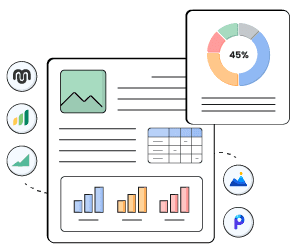
Do you know what’s common between a global IT firm and a small food truck business?
Like any other business on the planet Earth, they both require a solid business plan to make their business a runaway success.
Business plan. No entrepreneur is a stranger to this term, but do they all consider it seriously? Not sure.
Results? Spending a lot of time, money, and resources on the wrong marketing strategies, missing several growth opportunities, and of course, facing tough times raising funds.
No one wants to be in this situation!
That’s where a perfect business plan software can help you out. These tools make drafting an investment-ready business a breeze.
So how exactly can these business planning tools help?
Simply put, business plan software can help you create a winning business plan, develop marketing strategies, and predict your financial future—ultimately helping your business grow.
Now, how to choose a tool that will suit your business’s requirements and your budget too? The answer is right here.
In this article, we’ve narrowed down our search for the best business plan software to the 10 best paid and free software considering factors like—pricing, features, performance, and credibility.
So you can easily pick the one that best suits your requirements.
All sorted? Shall we begin? Let’s roll.
Best Paid and Free Business Plan Software and Tools
Jump to section, 1. upmetrics.

Upmetrics is a top business and financial planning software helping entrepreneurs and small business owners start and grow their businesses.
Its 200+ fully customizable sample business plans, video tutorials, well-written documentation, and go-to guides make writing a business plan a lot easier for someone new to business plan writing.
The best part about Upmetrics is—it’s affordable, reliable, and best for beginners.
In fact, the creators of Upmetrics believe that creating a business plan requires no special qualifications, nor a degree in finance to draw financial projections.
And the tool they’ve created speaks volumes of their words—making it a go-to solution for budding entrepreneurs.
Let’s have a look at the features you get with Upmetrics—the #1 business plan software:
- 400+ fully customizable business plan templates to get started.
- Easy-to-use business plan builder with drag and drop tools.
- Financial forecasting tool to plan and manage your cash flow with ease.
- Easy to share or collaborate with the team in real time.
- Pitch deck creator to create perfect pitches and impress investors.
- Createactionable business strategies using various business model canvases.
- Easily customize and edit cover pages.
- Real-time updates and cloud storage, eliminating the risk of data loss.
- Business resources, video tutorials, and guides to help get started.
- Intuitive, seamless, and responsive user interface.
The Upmetrics subscription starts at $7/month (billed annually) with one workspace; it also provides a free demo and a 15-day money-back guarantee —so no risk at all!
Create winning Business Plans with ultimate
AI Business Plan Generator
Plans starting from $7/month
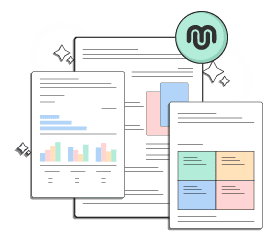
What People Say About Us

2. Liveplan
LivePlan is one of the best and most renowned business planning, budgeting, and performance-tracking software for startups and small business owners.
Whether you are a startup looking to attract potential investors or an established organization that needs help creating a forecast of your business’s financial future—LivePlan can help.
LivePlan simplifies the process of creating a professional business plan with its instruction manuals, tutorials, and expert guidance, whereas its automated financials built-in with formulas ensure precise financial forecasting.
LivePlan provides a wide range of features which may include:
- Business plan templates
- Budgeting and expense tracking
- Online learning tools & resources
- Collaborative planning
- Pitch deck creator
- Dashboard and reporting
- Integrated document storage
| Liveplan | Upmetrics | ||
|---|---|---|---|
| Can't Miss to Compare | |||
| Minimum Pricing | |||
| Unlimited | 5 | 5 | |
| Free Demo | No | No | |
| Core Capabilities | |||
| Business plan builder | |||
| Budgeting & forecasting | |||
| One-page pitch builder | |||
| AI Assistance | |||
| Business plan templates | |||
| Strategic planning | |||
| Support | Email and chat | Email and chat | |
Though LivePlan has been in the market for a long time now, it isn’t suitable for short-term business planning. That’s why we recommend exploring some LivePlan alternatives.
LivePlan’s subscription model consists of two plans: standard and premium. The standard plan costs $20/month, whereas the premium plan costs $40/month. However, they do not have any free trial or demo as a part of their pricing plan.
| Liveplan | Upmetrics |
|---|---|
What I didn't like about LivePlan?
Here are the average user ratings, comparing the experiences on Liveplan and Upmetrics.
| Liveplan | Upmetrics | |
|---|---|---|
| Ease of use | ||
| Features | ||
| Value for money | ||
| Customer support | ||
| Overall rating | ||
Compare Liveplan with Others

Liveplan vs. Enloop: Which is Best for Your Business?

IdeaBuddy vs. Liveplan: Which is Best for Your Business?

Bizplan vs. Liveplan: Which is Best for Your Business?
Enloop is an advanced business planning and financial forecasting tool helping business owners maximize the potential of their business venture.
Unlike Upmetrics and LivePlan—Enloop is designed for individuals with prior financial knowledge and business planning experience.
Understanding all of its functionalities is tough, but it has a lot to offer once you figure out its basic functionalities. Still, it’s not the most intuitive and user-friendly application in this space, so it may take a while to get used to it.
If you’re not a beginner and are willing to invest some time understanding and learning its functionalities—it’s well worth it. But, if you’re not, you may consider looking for a few other business plan software.
Enloop provides a wide range of advanced financial tools and business planning features, which may include:
- Business plan creation
- Automated financial forecasts
- Collaboration and sharing
- Funding and investor tools
- Exporting and integrations
- Auto-generated financial reports
- Automated text writing
| Enloop | Upmetrics | ||
|---|---|---|---|
| Can't Miss to Compare | |||
| Minimum Pricing | |||
| Team Member | 2 | 5 | |
| Free Demo | Available | No | |
| Core Capabilities | |||
| Business plan builder | |||
| Budgeting & forecasting | |||
| One-page pitch builder | |||
| AI Assistance | |||
| Business plan templates | |||
| Strategic planning | |||
| Support | Email and chat | ||
Enloop’s monthly subscription plans range between $19.95 and $39.95, depending on your plan and functionalities. It also has a 7-day free trial with no credit card details required.
| Enloop | Upmetrics |
|---|---|
What I didn't like about Enloop?
Here are the average user ratings, comparing the experiences on Enloop and Upmetrics.
| Enloop | Upmetrics | |
|---|---|---|
| Ease of use | ||
| Features | ||
| Value for money | ||
| Customer support | ||
| Overall rating | ||
4. IdeaBuddy
Ideabuddy is an innovative business plan software helping new-age entrepreneurs turn their ideas into successful business plans.
Customizable templates, industry-based guides, and streamlined idea and business plan creation make it one of the most user-friendly applications on the list.
It is designed on a principle where users can develop, test, and launch their business idea—all in one place. While it’s great for idea creation, it may lack several comprehensive business planning features.
Financial forecasting is vital to a business plan, but IdeaBuddy may not provide all the necessary financial tools for accurate projections.
So if your business is in the idea stage—choosing IdeaBuddy could be a fair call, but if you plan to build a comprehensive business plan, you need another tool.
IdeaBuddy provides a wide range of features, which may include:
- Modern business plan with a click
- Export your plan and financials
- Mobile-friendly platform
- Customizable templates and industry-based guides
- Test to score your idea
- Step-by-step business guide
- Brainstorm ideas with your team
| IdeaBuddy | Upmetrics | ||
|---|---|---|---|
| Can't Miss to Compare | |||
| Minimum Pricing | |||
| Team Member | 1 | 5 | |
| Free Demo | Available | No | |
| Core Capabilities | |||
| Business plan builder | |||
| Budgeting & forecasting | |||
| One-page pitch builder | |||
| AI Assistance | |||
| Business plan templates | |||
| Strategic planning | |||
| Support | Email and chat | Email and chat | |
IdeaBuddy’s subscription model consists of four plans: free, dreamer, founder, and team pro.
Depending on the plan specifications and features, these plans may cost between $15 to $40 a month. You can also save up to 60% on annual memberships.
| IdeaBuddy | Upmetrics |
|---|---|
What I didn't like about IdeaBuddy?
Here are the average user ratings, comparing the experiences on IdeaBuddy and Upmetrics.
| IdeaBuddy | Upmetrics | |
|---|---|---|
| Ease of use | ||
| Features | ||
| Value for money | ||
| Customer support | ||
| Overall rating | ||
Planful is a business planning and financial performance management cloud software. It provides a structured framework for industry-wide businesses to develop, track, and execute their plans.
The tool specializes in financial performance management with advanced features like—financial close management, reporting, and consolidation.
While the tool has numerous advanced features and functionalities—they all come with a high price tag as it’s mainly designed for medium and large-scale enterprises.
Let’s have a look at the extensive financial tools and features you may get with a planful subscription:
- Budgeting and forecasting
- Financial consolidation
- Scenario modeling
- Reporting and analytics
- Financial close management
- Data integration and connectivity
- Responsive web and mobile apps
Planful has no structured pricing model on their website; users may contact their sales team for a custom quotation.
What I didn't like about Planful?
6. iPlanner
iPlanner is an enterprise business plan software that has been helping entrepreneurs develop their business plans since 2007. It is suitable for businesses looking to secure funding, better understand and manage risks, or communicate the company’s business model and strategy to the team.
Though the business plan software has been around for over a decade now, it didn’t seem to cope with the technological advancements, so it may not provide the most intuitive and visually appealing user interface.
But if you are searching for an affordable business planning and performance tracking tool with KPIs, analytics, and reporting features, iPlanner can be a good investment.
Here’s an overview of the key features of iPlanner—business plan software:
- Financial forecasting
- Secure and accessible
- Data security and backup
- How to articles and guides
iPlanner’s subscription model consists of two plans: professional and corporate. Professional subscriptions start at $24 for a 3-month subscription with one project, while corporate subscriptions start at $59 for a 6-month subscription with 12 projects
What I didn't like about iPlanner?
7. PlanGuru
PlanGuru is a business planning software that helps entrepreneurs make better decisions, increase profits, and accomplish their business goals through strategic business planning and accurate forecasting.
Budgeting & financial analytics, rolling forecast, and strategic planning are three critical components of PlanGuru’s feature list.
PlanGuru specializes in forecasting financial statements, scenario analysis, budgeting, and gaining insights through reporting tools.
It offers many advanced financial forecasting features but is quite expensive— making it unsuitable for startups with limited investment capital.
PlanGuru provides a wide range of financial tools and business planning features to create business plans, which may include:
- Business valuation tool
- 20+ standard forecast methods
- Budget/forecast for up to 10 years
- Archive budget feature
- Standard report export to PDF, Excel, and Word
- Custom report builder for Excel
- Online dashboard, scorecard, and reporting tools
PlanGuru has two different pricing plans; one for businesses and nonprofits and another for business advisors. Depending on the plan specifications and features, these plans may cost between $99 and $299/month.
What I didn't like about PlanGuru?
8. The Business Plan Shop
The Business Plan Shop is a business & financial planning and analysis platform for small and medium-sized business owners and financial advisors.
Its business plan templates make writing a business plan relatively easier for beginners. Despite its many features, the business plan software specializes in financial analysis, forecasting, and KPI tracking.
It surely has a few advanced features but can be expensive for startups and small businesses.
This business plan software provides a wide range of features, which may include:
- Financial forecasting software
- Sync accounting data
- Drag and drop templates and editor
- Integration with financial data
- Faster than Microsoft Word
The Business Plan Shop has two different pricing plans; one for businesses and CFOs and another for advisors. The business & CFO plan costs $25.50 per month, and the Advisor plan costs $94.20 per month.
What I didn't like about The Business Plan Shop?
Bizplan is a comprehensive business plan software helping startups, entrepreneurs, and small business owners create business plans with direct access to planning experts.
Financial tools help create detailed financial projections and financial and cash flow statements in no time, so entrepreneurs can spend more time growing and scaling their businesses.
The platform also has a fundraising tool to help startups connect with potential investors—which has already helped raise over $500 million for startups.
It has all the features to create a basic business plan but may lack industry-specific guidance or assistance.
Let’s have a look at the wide range of features that come with a Bizplan subscription:
- Financial modeling
- Integration and export
- Reporting and presentation
- Progress tracking
- Step-by-step guidance
| Bizplan | Upmetrics | ||
|---|---|---|---|
| Can't Miss to Compare | |||
| Minimum Pricing | |||
| Team Member | Unlimited | 5 | |
| Free Demo | No | No | |
| Core Capabilities | |||
| Business plan builder | |||
| Budgeting & forecasting | |||
| One-page pitch builder | |||
| AI Assistance | |||
| Business plan templates | |||
| Strategic planning | |||
| Support | Email, call, chat | Email and chat | |
Bizplan’s pricing plans start at $29/month, whereas the lifetime access costs $349. You may check their pricing page for more information.
| Bizplan | Upmetrics |
|---|---|
What I didn't like about Bizplan?
Here are the average user ratings, comparing the experiences on Bizplan and Upmetrics.
| Bizplan | Upmetrics | |
|---|---|---|
| Ease of use | ||
| Features | ||
| Value for money | ||
| Customer support | ||
| Overall rating | ||
Brixx is a financial forecast software for cash flow, budgeting, and financial planning. Apart from helping users create a basic business plan, the platform also helps them with financial modeling, scenario planning, and goal tracking.
Its interactive charts and graphs can help you clearly present your financial data and cash flow statements for enhanced reader understanding.
Integrating Brixx and other accounting software automates the syncing of your actuals and forecasts, giving you a head start using Brixx.
The tool primarily focuses on financial projections and forecasting, so there are only a few features for other parts of the business plan.
Let’s have a look at the wide range of features that come with a Brixx subscription:
- 1-10 year financial forecasts
- Professional charts and reports
- Automated tax forecasts
- Quick-start templates
- Share plans in real-time
- Business Resources
- 3-way forecasting
Brixx has four packages in its subscription model: Foundation, Essentials, Professional, and Enterprise. The pricing for these packages may range from $0 to $66 per month.
What I didn't like about Brixx?
How to Choose the Right Business Plan Software?
All the business plan tools on our list are credible and can help you create a winning business plan. However, it’s critical to understand each tool specializes in certain aspects of business planning.
Let’s understand which factors to consider while choosing the right tool to help you create a professional business plan:
The most obvious factor. Ask yourself how much you can afford to spend on a business plan maker.
A free or low-cost tool may provide only some necessary functionalities to create a detailed plan. So, figure out your budget and shortlist the tools that you can afford to invest in.
2. Your specific requirements
The next step. Learn your specific requirement. For instance, if your business is in the idea stage, you may not require a tool with advanced financial features like—PlanGuru; Ideabuddy may work.
Both tools cater to specific audiences; if you are not sure, you may go with Upmetrics. It has pricing plans suitable for all business sizes.
3. Business plan templates
Custom designing a business plan can be tedious, so make sure the business plan software you choose has industry-specific templates to help you get started.
4. AI assistance
Artificial Intelligence has revolutionalized the way people get their things done. Make sure you select a platform that also provides AI assistance while creating a business plan.
With tools like ChatGPT and AI business plan generator, you can draft a business plan in a breeze.
5. Charts and graphs
Let’s face it, no one likes to read long paragraphs. The tool you choose must be able to turn your financial data and balance sheets into appealing and easy-to-understand charts and graphics.
6. Financial projections
Most critical section of a business plan. Understand your requirement regarding financial projections and the level of features the tool provides.
For instance, a large-scale organization may require a tool that can easily do business financials for ten or more years.
7. Contribution and sharing features
Make sure the tool you choose must provide the contribution and sharing features so that you can work with multiple team members.
8. Convenience and user-friendliness
A no-brainer. Ensure the software you choose has a user-friendly user interface and a manageable learning curve to understand all the working features.
9. Integrations
Some of the best business plan software integrates with accounting software. This feature can be handy while transferring financial details into your business plan.
10. Step-by-step guides
These user guides and tutorials can help you easily outline and prepare the first draft of your business plan, so make sure you consider this as one of the factors while selecting a tool.
11. Support
You are new to business planning software and may need help using some of its features. A responsive support team can help you get back on the right track.
Think of these factors as a checklist while researching the right business plan software. Once you have checked off all the boxes, you will have the right business plan software by your side.
Pros and Cons of Using Business Plan Software
Undoubtedly, business plan software can be a worth-it investment for your business, but it surely has a few disadvantages too. Let’s get to that:
- Time Saving: business plan software can be a big time-saving investment.
- Step-by-step guidance: These guides make it easier to get started for beginners.
- Accurate reporting: Good business plan software guarantee the accountability and accuracy of the reports generated.
- Customizations: Business plan tools also offer options to personalize your reports.
- Generic templates: These planning tools often provide generic templates that may not suit your requirements.
- Limited flexibility: In terms of formatting, content, design, and layout.
- Learning curve: Using these tools requires a learning curve to navigate the software.
There have to be a few disadvantages, but they are negligible when you look at the positive side of having a business plan software onboard.
And this section leads us to our conclusion!
That was the article for today with some of the best business plan software. Now over to you. Revisit the top business planning software on the list, do your research, and select the one that best suits your requirements.
Got any more burning questions in mind? The FAQ section starts right after we wrap this article up, feel free to explore. Happy business planning!
Other Business Plan Software Alternatives
- Best 8 Liveplan alternatives
- Top Bizplan alternatives & competitors
- 8 Growthink alternatives
- Best Ideabuddy Alternatives
- Best Enloop Alternatives
Say No to Expensive Business Planning Software!
Get Affordable and Feature-Packed Business Planning with Upmetrics

Frequently Asked Questions
What is the best business plan software for startups.
We’ve already mentioned the best business plan software in the blog post earlier; you may choose one amongst those depending on your specific needs.
However, Upmetrics can be a go-to business planning software for startups as it only costs $9 per month to get started—which is worth it against the value you get.
Which tool is used as a one-page business plan?
There are many business plan software providing features to create one-page business plans like—Upmetrics and Ideabuddy. You can use Upmetrics’ strategic planning feature to develop actionable and entrepreneur-focused one-page business plans.
Can I write a business plan myself?
Of course, you can. It’s easier than ever to write a business plan with the emerging use of tools like ChatGPT. Though you can write a business plan, you need assistance making it presentable for your investors.
And business plan software providers like Upmetrics can help you do that. With 200+ sample business plans, you can easily write the first draft of your business plan.
What is the best way to write a business plan?
There cannot be a standard answer to this question. There are various business planning processes, and all of them might not work for you. Still, considering the time-saving approach, using an industry-specific template and editing it as per your requirements can be an easy way to write a business plan.
Using ChatGPT for business plan writing can also be one of the best ways to write a business plan. As mentioned, there can’t be a specific answer to this question; find a way that best suits your needs.
Is there any free business plan software available?
It’s really challenging to find the perfect business plan software, that too, for free. IdeaBuddy from our list has a free plan, but it comes with very limited features, not so helpful for creating a business plan.
Business plan software like Upmetrics, Bizplan, and LivePlan also have free trials, so you may try their features before purchasing. Furthermore, you can get a 30% off on an Upmetrics subscription if you are a nonprofit or student.
How much does business plan software typically cost?
The cost of a business plan software can widely depend on the level of features and functionalities they provide. Still, the monthly subscription of a business plan tool can range anywhere between $5 to $300.
About the Author
Upmetrics Team
Upmetrics is the #1 business planning software that helps entrepreneurs and business owners create investment-ready business plans using AI. We regularly share business planning insights on our blog. Check out the Upmetrics blog for such interesting reads. Read more
We use essential cookies to make Venngage work. By clicking “Accept All Cookies”, you agree to the storing of cookies on your device to enhance site navigation, analyze site usage, and assist in our marketing efforts.
Manage Cookies
Cookies and similar technologies collect certain information about how you’re using our website. Some of them are essential, and without them you wouldn’t be able to use Venngage. But others are optional, and you get to choose whether we use them or not.
Strictly Necessary Cookies
These cookies are always on, as they’re essential for making Venngage work, and making it safe. Without these cookies, services you’ve asked for can’t be provided.
Show cookie providers
- Google Login
Functionality Cookies
These cookies help us provide enhanced functionality and personalisation, and remember your settings. They may be set by us or by third party providers.
Performance Cookies
These cookies help us analyze how many people are using Venngage, where they come from and how they're using it. If you opt out of these cookies, we can’t get feedback to make Venngage better for you and all our users.
- Google Analytics
Targeting Cookies
These cookies are set by our advertising partners to track your activity and show you relevant Venngage ads on other sites as you browse the internet.
- Google Tag Manager
- Infographics
- Daily Infographics
- Popular Templates
- Accessibility
- Graphic Design
- Graphs and Charts
- Data Visualization
- Human Resources
- Beginner Guides
Blog Feature Updates Startup Business Plans 101: Your Path to Success
Startup Business Plans 101: Your Path to Success
Written by: Jay Nair Jul 24, 2023

It’s time — you’ve got a promising idea and you’re now prepared to invest the necessary effort to turn it into reality. Startup business plans are vital hack tools that will guide you through your entrepreneurial journey and a business venture with clarity and purpose.
Though vital, business planning doesn’t have to be a chore. Business plans for lean startups and solopreneurs can simply outline the business concept, sales proposition, target customers and sketch out a plan of action to bring the product or service to market. These plans will serve as strategic documents outlining your company’s vision, mission statements, business objectives, target market, financial forecasts and growth strategies.
To simplify the creation of a robust business plan as an entrepreneur, you can harness the power of a business plan maker . This invaluable tool streamlines the process and ensures a polished and well-organized presentation. Startup business plan templates provide pre-designed frameworks that can be customized to suit your specific industry needs, saving valuable time and effort while preserving the essential structure of a comprehensive business plan.
Ready to begin? Let’s go!

Just so you know, some of our business plan templates are free to use and some require a small monthly fee. Sign-up is always free, as is access to Venngage’s online drag-and-drop editor.
Click to jump ahead:
- Laying the foundation of your startup business plan
- Business plan executive summary
- Writing your business description
- Marketing & sales strategies
- Startup operational plans
- Financial plans – forecasting and projections
- Team and management
- Appendix and supporting documents
FAQs on startup business plans
- Use Venngage to create your startup business plan
Preparation and research: 6 steps to laying the foundation of your startup business plan
- What problem does your product or service solve?
- Who are your target customers?
- What differentiates your offering from existing solutions in the market?
This self-reflection will help you establish a clear direction for your startup.
- Next, conduct market research to gather valuable insights about your target market , including demographics, preferences, and purchasing behavior . This data will enable you to tailor your product or service to meet the specific needs of your customers. Identify trends, industry growth projections, and any potential barriers or challenges you may encounter.
- Competitive analysis is another critical aspect of preparation and research. Study your competitors to understand their strengths, weaknesses, and strategies. Analyze their pricing, marketing tactics, customer experience, and product/service features. This analysis will allow you to identify gaps in the market and position your startup to offer a unique value proposition .
- Financial research is equally important during this phase. Calculate the costs associated with starting and operating your business , including overhead expenses, production costs, marketing expenses, and employee salaries. Assess potential revenue streams and estimate your expected sales. This financial analysis will help you determine the feasibility of your business idea and outline a realistic financial plan.
- Additionally, gather information about legal and regulatory requirements that apply to your industry and location . Understand the necessary permits, licenses, and certifications you need to operate legally. Complying with these regulations from the outset will prevent potential setbacks or legal issues in the future.
- Finally, organize your findings and insights into a coherent business plan. Create your business plan outline , list your business plan goals, strategies, target market, competitive analysis, marketing plan, financial projections and any other relevant information. This compilation will serve as a roadmap for your startup, guiding your decisions and actions moving forward.
You’ve just encountered a wealth of information and are well on your way to becoming a seasoned business owner! This can sometimes feel overwhelming. But don’t worry, take a moment to breathe deeply and remember how far you’ve come. You’ve got this!
To help you condense and organize your essential points, I have brilliant one-page samples of business plan layouts and templates that will capture everything in a concise format.

Knowing when to use a one-page business plan versus a more comprehensive plan depends on various factors. A one-page business plan is ideal for providing a quick overview, saving time, and internal planning. However, it may not suffice for detailed information, complex business models, or meeting external stakeholders’ expectations.
Ultimately, consider the purpose, audience, and complexity of your business when deciding whether to utilize a one-page business plan or opt for a more detailed approach.
Executive Summary: Your Startup’s Elevator Pitch
First impressions are crucial, and a concise yet comprehensive executive summary is your chance to grab potential investors’ attention.
To create a compelling elevator pitch, consider the following key elements:
Problem Statement : Clearly articulate the problem or pain point that your startup addresses. Emphasize the significance of the problem and the potential market size
Solution : Concisely describe your innovative solution or product that solves the identified problem. Highlight its unique features or benefits that differentiate it from existing alternatives.
Target Market : Define your ideal customer segment and outline the market potential. Demonstrate a deep understanding of your target audience’s needs, preferences, and behavior.
Competitive Advantage : Showcase the competitive edge that sets your startup apart from competitors. This could include intellectual property, strategic partnerships, cost advantages, or disruptive technology.
Business Model : Briefly explain how your startup generates revenue and sustains profitability. Outline your monetization strategy, pricing model, and any recurring revenue streams .
Traction and Milestones : Highlight any significant achievements or milestones reached by your startup. This could include customer acquisitions, partnerships, product development progress, or market validation.
Team : Showcase the expertise and qualifications of your founding team or business partners. Highlight key members and their relevant experiences demonstrating their ability to execute the business plan.
I can sense your eagerness to dive right in! To expedite your progress, I’m excited to present you with a collection of meticulously crafted executive summary templates. These templates have been thoughtfully designed and structured by Venngage designers, ensuring seamless integration into your thorough business plan. All you need to do is infuse them with your brilliant startup ideas, and you’ll be well on your way to success!

Now, remember that there’s still a ton of work to be done. Let’s take a moment to regroup and ensure we’re on the right track. Before diving into the process of writing your business plan , it’s imperative to gather a wealth of essential information. Conducting comprehensive research is key, and it should encompass the following aspects:
How to assess your target audience
To gain comprehensive insights into your potential user base, creating a user persona report is invaluable. This persona guide report will help you develop a detailed understanding of various user profiles, enabling you to tailor your products or services to meet their specific needs and preferences.
Understanding Your Market and Competition
Analyze your market and any trends relevant to your startup. Research your competitors, their strengths and weaknesses, and identify what differentiates your offering from the competition.
Developing a Unique Value Proposition
A business Unique Value Proposition (UVP) is a concise statement that communicates the unique advantage a product or service offers over competitors, addressing a specific problem or need. It highlights the distinctive value and benefits customers can expect, helping businesses attract and retain customers by differentiating themselves in the market.
Your unique value proposition (UVP) is the cornerstone of your startup, defining what sets you apart from your competitors. A strong UVP focuses on the specific benefits and solutions your startup offers to customers.
Company Description: Painting the Picture
Your company description allows you to showcase your startup’s unique features and provide more in-depth details about your business. This section should include:
The Purpose of the Company Description
Clarify the purpose of your business, your goals and how your startup is uniquely positioned to achieve them.
Essential Information to Include
Include details such as your company’s legal structure, location and a brief history of any founders or key personnel.
Showcase Your Company’s Unique Features
Emphasize the unique aspects of your startup, explaining how these features translate into a competitive advantage.
Allow me to provide you with a dash of inspiration to ignite the momentum for your startup business plan:
When it comes to showcasing your company’s unique features, keep in mind that it is essential to emphasize and highlight the distinctive aspects of your startup . Clearly articulate how these features set your company apart from competitors and translate into a tangible competitive advantage .
Whether it’s through cutting-edge technology, innovative business models, exceptional customer service, or a combination of factors, conveying the value and impact of these unique features is crucial. By effectively communicating the benefits they bring to customers, investors, and partners, you can demonstrate the significance of your offerings and differentiate yourself in the market.
Product/Service Line: What You’re Bringing to the Table
This section highlights the finer details of your product or service offerings:
Detailing Your Product/Service Offerings
Provide a thorough description of your products/services, highlighting key features and their intended use.
Highlighting Features, Benefits, and Solutions
Demonstrate how your startup’s offerings solve specific problems or address customer needs through an analysis of product features and associated benefits.
Defining Your Pricing and Revenue Model
Outline your startup’s pricing strategy and how it aligns with the overall business model. Detail any plans for scaling or expanding your revenue sources in the future.
Presenting Your Market Research Findings
Share insights from your market research, including target customer demographics, market size, and growth potential.
Identifying Market Trends and Opportunities
Discuss current trends, emerging opportunities, and how your startup will capitalize on these developments.

Marketing and Sales Strategies: Spreading the Word
Developing a robust marketing and sales strategy plan aligns with your overall business strategy and ensures steady growth. Marketing planning will be an essential part of your journey once you’ve got your business plan tight-knit! Also, creating a marketing strategy can be the most fun part of your business plan!
Developing a Comprehensive Marketing Strategy & Plan
- Outline Specific Marketing Goals : Clearly define your marketing objectives, whether it’s increasing brand awareness, driving website traffic, generating leads, or boosting sales . Set measurable targets to track progress.
- Identify Target Audience : Conduct thorough market research to identify your ideal customer profiles. Understand their demographics, behaviors, preferences, and pain points. Tailor your marketing messages to resonate with their needs.
- Select Effective Marketing Channels : Consider both digital and traditional channels that align with your target audience and marketing goals. This may include online advertising, social media marketing, content marketing, search engine optimization (SEO), email campaigns, print media, events, or partnerships.
- Craft Compelling Messages : Develop persuasive and consistent messaging that highlights the unique value proposition of your products or services. Clearly communicate how your offerings solve customer problems or improve their lives.
5 Tips for Effective Sales Techniques and Growth Strategies + free templates
- Define Your Sales Strategy : Outline the approach and tactics your sales team will use to reach and convert customers. This may involve direct sales, channel partnerships, online sales, or a combination of strategies. Specify your sales process, including lead generation, qualification, nurturing, and closing.
- Expand Your Customer Base : Identify opportunities to expand your customer reach. Consider targeting new customer segments, entering new geographic markets, or exploring untapped market niches. Develop strategies to attract and engage these potential customers.
- Penetrate New Markets : Assess the feasibility of expanding into new markets or verticals. Market research will help you understand the dynamics, competition, and customer needs in these markets. Adapt your marketing and sales strategies accordingly to effectively penetrate and capture market share.
- Innovate Products/Services : Continuously evaluate and enhance your product or service offerings to meet evolving customer demands. Identify areas for innovation or improvement and develop a roadmap for launching new features, versions, or complementary offerings.
- Perform a SWOT analysis : By conducting a sales SWOT analysis , you will gather valuable insights to enhance your department’s performance. This analysis involves evaluating your company’s strengths, weaknesses, opportunities, and threats, enabling you to identify areas for improvement and capitalize on advantageous factors in the market.
Here’s a hack to get you organized – Get right into it with the help of these growth strategy templates and strategic planning templates :

Operational Plan: How Your Startup Will Run
Define an efficient and scalable operational plan, keeping in mind the following points:
Defining an Efficient and Scalable Plan
Outline the day-to-day operations, including processes, timelines, and necessary resources.
Legal Considerations for Your Startup Business
Identify any legal requirements or considerations, such as licenses, permits, or regulations that may apply to your startup.
Key Elements of Supply Chain Management and Logistics
Discuss supply chain and logistical aspects relevant to your business. Include details on how you plan to manage and scale these processes.
Here’s a kickstart on how you can structure your operating plans:
Financial Projections: Crunching the Numbers
A startup’s financial projections are vital in securing investor buy-in. This section should address:
The Importance of Financial Forecasting and Budgeting
Explain the significance of accurate financial forecasting, budgeting, and the assumptions made in your projections.
Identifying Key Performance Indicators (KPIs)
Highlight the KPIs used to gauge your business’s financial health and growth trajectory.
Outlining Funding Requirements
Detail the amount and type of funding your startup requires , including how the funds will be allocated and how this investment positions the company for growth.
Team and Management Structure: Building Your Dream Team
Your startup’s success depends on the people behind it. This section should cover:
Tips for Building the Right Team
Share your strategy for assembling a skilled team that supports your startup’s vision and growth trajectory.
Founders’ Background and Roles
Provide an overview of the founders’ backgrounds, their roles within the company, and how their skills contribute to the startup’s success.
Organizational Structure and Key Management Personnel
Outline your startup’s organizational structure, including any key management personnel who play a pivotal role in day-to-day operations.
Appendices and Supporting Documents: Backing Up Your Plan
Include any other relevant supporting documents, such as:
- Research data, market analysis, or competitor analyses.
- Financial statements, budgeting or forecasting data, and other financial documentation.
- Legal documents, agreements or contracts, and any patent or trademark information.
Finally, remember to review and update your business plan regularly as the industry, market, and competitive landscape evolve!
1. Why is a business plan essential for a startup?
A startup business plan is crucial for a startup because it provides a framework for strategic decision-making, facilitates financial planning, helps assess risks, aligns teams, communicates your vision, and ensures effective resource allocation.
2. What should a startup business plan include?
A startup business plan should include:
- Vision and Direction : Set clear goals and objectives, and outline strategies to achieve them. With a well-defined plan, you will stay focused, make informed decisions, and ensure alignment with your vision.
- Market Analysis : A business plan necessitates thorough market research to understand your target market, identify competition, and assess product/service demand. These insights enable you to tailor offerings, meet customer needs, and gain a competitive edge.
- Financial Planning : By constructing a financial roadmap through projected statements such as income, cash flow, and balance sheets, a business plan unveils the expected revenues, expenses, and profitability. This comprehensive planning not only anticipates challenges and sets realistic goals but also serves as a magnet for attracting investors and securing funding.
- Risk Assessment : Devise strategies for risk mitigation and contingency planning. By proactively doing this, you can significantly enhance the likelihood of success by anticipating and effectively addressing potential obstacles.
- Communication and Team Alignment : From fostering effective communication with both internal and external stakeholders to aligning team members and showcasing your startup’s unique value proposition, a business plan plays a crucial role. It enables you to articulate target market insights, competitive advantages, and growth strategies to potential investors, partners, and employees.
- Resource Allocation : A business plan helps you identify the resources required to launch and operate your startup successfully. It includes an assessment of your human resources, technology needs, infrastructure requirements, and other key resources. By understanding your resource needs, you can allocate them effectively, ensuring that you have the necessary assets to execute your business strategy.
- Adaptability and Flexibility : Your business plan should be flexible enough to accommodate changes and adapt to new circumstances. Startups operate in dynamic environments, and a well-designed plan allows you to monitor progress, evaluate outcomes, and make adjustments as needed. This agility enables you to seize new opportunities and navigate challenges effectively.
3. What is the ideal length for a startup business plan?
The optimal length for a startup business plan typically depends on the specific requirements and intended audience, but a concise and focused plan of around 20 to 30 pages is often recommended.
4. How to write a good startup business plan?
To write a good and effective startup plan, include an executive summary, company description, market analysis, detailed products/services description and a clear marketing and sales strategy. Also incorporate a comprehensive financial plan, outline your organizational structure, and demonstrates your team’s expertise and capabilities. Your plan should be well-researched, concise, and compelling, with a focus on your company’s unique value proposition and market opportunity, making it attractive to investors and stakeholders.
Utilizing Venngage templates & other tools for success
A visually appealing and professional business plan needn’t be a daunting task. Leverage tools like Venngage Business Plan Maker for effective templates that cater to various industries and streamline the process.
- Leveraging Venngage for Visually Appealing and Professional Business Plans
Venngage offers a range of templates designed specifically for business plans, allowing you to craft a polished and visually engaging plan without any design experience. Simply choose a template, customize it to suit your startup’s branding, and populate it with your content.
- Exploring Additional Resources and Tools for Entrepreneurs. In addition to Venngage, several other resources and tools can assist entrepreneurs in crafting the perfect business plan. Examples include:
- Small Business Administration (SBA) – Offers guidance on writing business plans and provides templates and resources for each section.
- SCORE – A nonprofit organization providing mentorship, workshops, and other resources for entrepreneurs.
- Industry-specific resources – Research relevant professional organizations, industry publications, and blogs to stay up to date on industry trends and insights.
Embarking on the entrepreneurial path may present formidable challenges, yet it offers abundant rewards in various aspects. Embrace the art of continuous learning, delving not only into the essence of your business idea but also immersing yourself in the vast world that surrounds it. Cultivate a genuine passion for understanding every facet of your enterprise, for it is through this journey of exploration that you will uncover invaluable insights and experience the true fulfillment of entrepreneurship.
Discover popular designs

Infographic maker

Brochure maker

White paper online

Newsletter creator

Flyer maker

Timeline maker

Letterhead maker

Mind map maker

Ebook maker
The Best 10 Business Planning Tools for Startups
Business planning is one of the significant strategic approaches that startup companies use to showcase their core objectives and programs to achieve organizations goals. Young businesses also prefer to make solid business plans to attract investors.
Therefore, the use of authoritative business planning tools is crucial for startups. That is why this article shares one of the top business planning tools with all necessary features and pricing models.
- 1 Top 10 Business Planning Tools for Startups
- 2.1 Features
- 2.2 Pricing
- 3.1 Features
- 3.2 Pricing
- 4.1 Features
- 4.2 Pricing
- 5.1 Features
- 5.2 Pricing
- 6.1 Features
- 6.2 Pricing
- 7.1 Features
- 7.2 Pricing
- 8.1 Features
- 8.2 Pricing
- 9.1 Features
- 9.2 Pricing
- 10.1 Features
- 10.2 Pricing
- 11.1 Features
- 11.2 Pricing
- 12 Conclusion
- 14 What is Business Planning?
- 15 Why business planning is important?
- 16 What are ten of the best business planning tools?
Top 10 Business Planning Tools for Startups
Here are ten of the best tools that will help you writing a business plan.
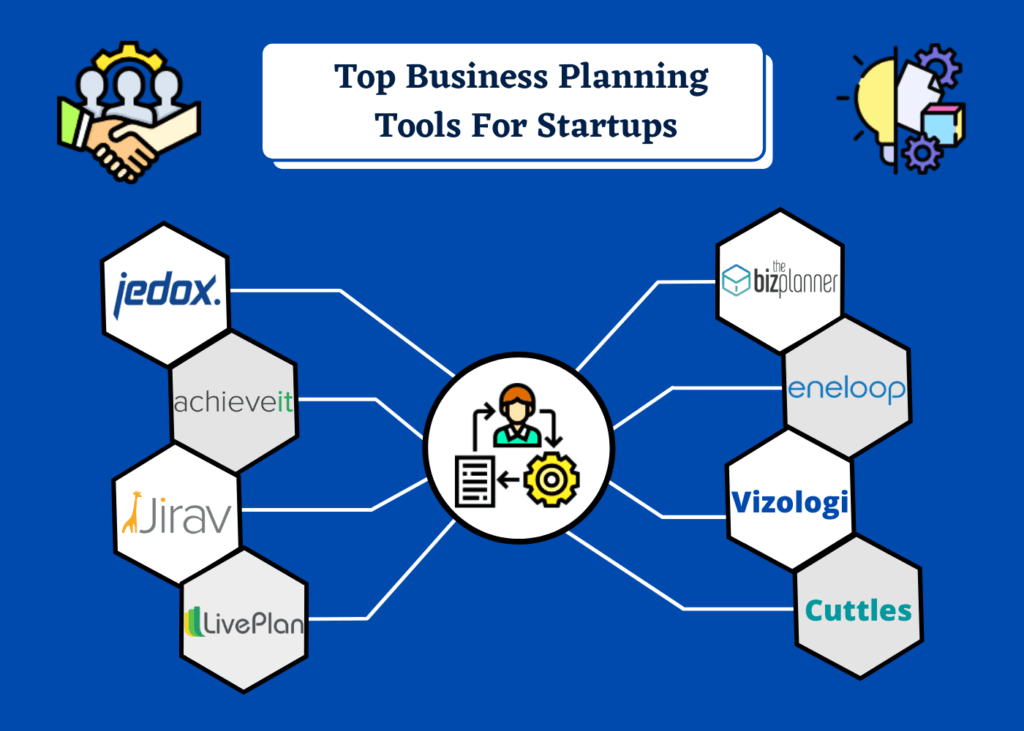
Enloop is a cloud-based business planning tool that 323,180 entrepreneurs, students and businesses have used. It can create around 16 financial ratios and real-time performance reports.
Financial Forecast — Businesses can automatically anticipate their financial reports with this tool.
Currency Support — It supports around 100 currencies, so people from different countries can smoothly use this app for business planning.
Real-Time Score — Enloop permits the startups to watch their real-time score to improve performance.
Its Free plan enables the businesses to get a 7-day free trial. But the monthly cost of its Detailed plan is $19.95.
2. LivePlan
LivePlan could be a reliable option for startups to nail down a solid business plan. Moreover, it also claims to build business plans 30% faster than the rivals. Luckily, 1 million small businesses, enterprises and entrepreneurs have shown trust in this tool.
Sample Plans — It is the perfect business tool for new teams because they can get guidance from 500+ already available sample plans.
Professional Documents — LivePlan also enables the startups to design an engaging business plan and other documents to convince investors.
LivePlan comes with two plans Standard and Premium, and its monthly charges start from $20.
3. IdeaBuddy
If you are finding an ingenious business planning tool, then you shouldn’t ignore IdeaBuddy. With planning, development and real-time evaluation, its financial projection properties are also appealing.
One-Page Plan — Startups can build a business plan within 30 minutes, and yes, it could consist of a single page for ease of understanding.
Financial Properties — Financial calculators, profit and loss statements, and forecasts benefit from using IdeaBuddy.
The yearly cost of its Dreamer plan is $65, but only 1 collaborator is eligible for it. However, for 3 and 30 collaborators, you can also consider its Founder and Team plans. The yearly charges of these plans commence from $115.
Cuttles is one of the most straightforward business planning tools that 20,000+ startups are using. It could surely be a great option when it comes to building startup plans.
Canvas — This property aids the young companies to smoothly architect and corroborate their business idea.
Suitable for Teams — It also allows the startups to easily include the teams’ ideas while making a business plan.
Its Free plan is applicable for 1 member and offers restricted features. On the other hand, you can consider its Seed, Grow and Series plans with more advanced characteristics. Its Seed plan bills €8/month to users.
5. Vizologi
Vizologi is an AI-backed business planning tool that is the foremost choice of students, strategists, managers, entrepreneurs and consultants. The availability of free business models also differentiates it from rivals.
Business Intelligence — Companies can make wise decisions using premium analytics and data reports.
Business Plan — Its business plan includes a mash-up method, canvas, SWOT & PEST analysis.
Although Vizologi confers a free trial, but its monthly charges commence from $9.
6. TheBizPlanner
TheBizPlanner is also a unique business planning tool. This end-to-end business planning software comes with four significant properties: profile, connect, plan and collaborate.
Dashboard — The single screen dashboard provides all reports to businesses.
Campus Edition — It has also released an exclusive edition for educators.
Fortunately, TheBizPlanner Pro is free for startups now. Howbeit, you can talk with the sales team to get the pricing of its Competition plan.
7. AchieveIt
AchieveIt is a purpose-built Georgia-based strategic business planning solution that was founded in 2010. This is an ideal business planning platform for all sectors, including credit unions, commercial, healthcare, federal and local governments.
Integrated Tool — It provides data uniformity and great accountability for execution.
PowerPoint Digestibility — This tool could be easily connected with PowerPoint.
This platform bills $70 per user and month under its Core plan.
8. PlanGuru
PlanGuru is also a considerable business planning, forecasting and budgeting software that startups should use. Furthermore, it is more suitable for accountants, small businesses and nonprofit organizations than big enterprises.
Forecasting — PlanGuru provides 20 powerful forecasting tools to businesses.
Analysis in Minutes — Users can get all historical data analysis within minutes.
The monthly cost of its cloud and desktop version starts from $99.
Jedox is a unified business planning and forecasting solution that 2500+ companies use worldwide. The major brands that are practicing Jedox are ManpowerGroup, McDonald’s and Bosch.
Timely Insights — Time-intensive planning has become essential for startups, and it is only possible with timely insights.
Predictive Forecasting — It is packed with artificial intelligence-based predictive forecasting and planning features.
Jedox comes with four major plans Essential, Business, Professional and Performance. However, you will have to click the ‘Get A Quote’ tab to explore the pricing.
If you want business planning software for VC funded companies, growth and accounting firms, then Jirav is the best option for you. This is a smart and all-in-one budgeting, planning and forecasting tool.
Automatic Imports — Jirav could automatically integrate all of your business data. Companies can also connect it with accounting and workforce software like Gusto, Xero and QuickBooks.
Reports & Dashboards — It provides both commercial and non-financial information.
Starter and Pro are core plans of Jirav that monthly cost $250 and $850, respectively.
Business planning is critical for startups and founders to execute a business idea successfully. The use of smart and interactive business planning software and solutions definitely help the new businesses in convincing VCs to fund them. In this regard, entrepreneurs can utilize the above best performing business planning tools.
To discover more startups tools, please refer to the article Top Startup Tools .
What is Business Planning?
Business planning typically applies to organizing ideas in a formal business plan that summarizes the business’s current state.
Why business planning is important?
– Steer the business – Define milestones – Help with funding
What are ten of the best business planning tools?
– Enloop – Live Plan – IdeasBuddy – Cuttles – Vizologi – TheBizPlanner – AchieveIt – PlanGuru – Jedox – Jirav
Jessica Clark
I'm a professional software engineer freelancer. I'm passionate about coding and tech startups.
Leave a reply Cancel reply
Your email address will not be published.
Save my name, email, and website in this browser for the next time I comment.

We earn commissions if you shop through the links below. Read more
5 Best Business Plan Software Platforms
Back to Business Plans
Written by: Carolyn Young
Carolyn Young is a business writer who focuses on entrepreneurial concepts and the business formation. She has over 25 years of experience in business roles, and has authored several entrepreneurship textbooks.
Edited by: David Lepeska
David has been writing and learning about business, finance and globalization for a quarter-century, starting with a small New York consulting firm in the 1990s.
Published on March 7, 2023 Updated on July 5, 2024
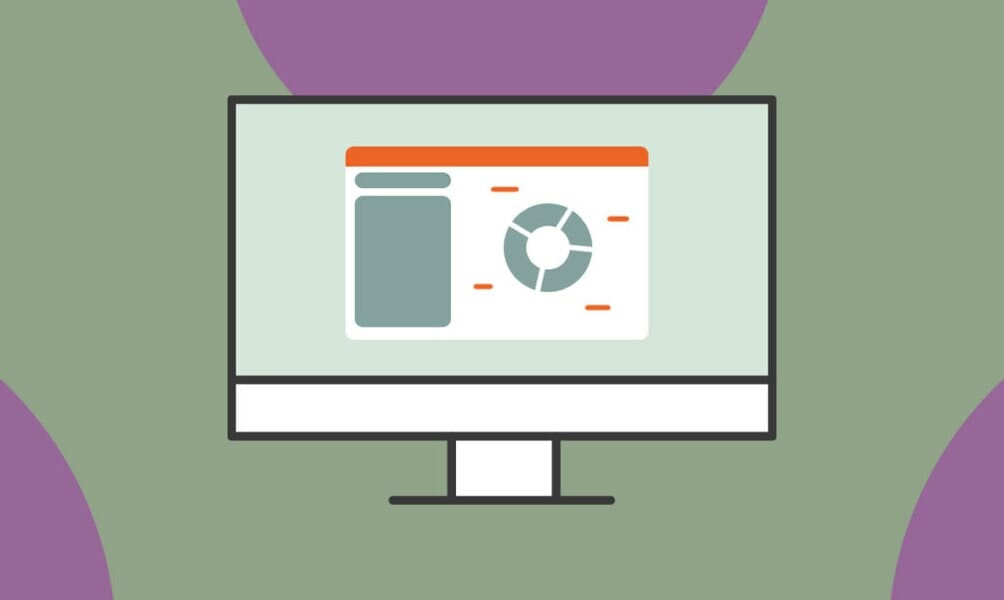
Starting a business requires completing countless tasks, and a key early hurdle is writing a business plan . Entrepreneurs who aren’t looking for funding often think they can skip it, but that’s never a good idea.
A sharp and detailed business plan is essentially a business owner’s commitment to and preparation for the road ahead, detailing the operations , revenues, and potential growth. It’s a lot of work, but quality business plan software can ease that burden by guiding you through the process, helping with financial projections and more.
Yet with so many options out there, how do you know which one is right for you? This handy guide reviews the top five software choices to ensure you select the best tool for you and your business.
Best Overall
- Pricing: Standard Plan ($20/month) and Premium Plan ($40/month); annual discounts
- Integrations with Quickbooks and Xero
- 35 day money-back guarantee
Easiest to Use
- Pricing: Detailed Plan ($19.95/month) and Premium Plan ($39.95/month); annual discounts
- 7-day free trial (no credit card required)
- Real-time performance score
Best Support for Startups
- Pricing: $29 Monthly Plan, $249 Annual Plan, and $349 Lifetime Access
- Access to courses and videos to build your startup
- Access to Launchrock (customer acquisition platform) and Fundable (fundraising platform) included
Best for Financial Forecasting
- Pricing: Single Entity ($99/month) and Multi-Department Consolidations ($299/month); annual discounts
- Free trial (no credit card required)
- 30 day money-back guarantee
Best for Variety of Services
- Pricing: Single Plan ($15/month)
- Variety of other services offered including: business formation, expert consultations
- Industry-specific business plan templates
1. LivePlan
LivePlan is a leader in business plan software that stands out with software that offers tips and advice for business planning, funding, and growth. LivePlan offers two competitively priced business plan software packages.
Features and Pricing
LivePlan’s Standard package costs $20 per month and includes step-by-step planning, lender-ready financial statements, a full financial forecast, and a one-page pitch builder. You’ll also have access to more than 500 sample business plans.
Their Premium package costs $20 for the first month and $40 per month thereafter and includes everything above plus industry benchmark data and “what if” guides to help you prepare for the unexpected.
It also includes performance dashboards, real-time profit and cash forecasting, an automatic forecast builder, the ability to export sheets to Excel, and syncing with Quickbooks or Xero. LivePlan offers a 25% discount if you pay annually instead of monthly, as well as a 35-day money back guarantee.
Pros and Cons
- Clear, step-by-step business planning
- All-in-one financial tools for budgeting
- Clear pricing with a 35-day refund
- Customizable built-in templates
- Real-time partner collaboration
- LivePlan’s subscription costs might deter some users
- Exporting to Word or PDF formats can pose difficulties

LivePlan offers user-friendly business planning with valuable guidance at reasonable prices, backed by a 35-day money-back guarantee. We highly recommend it for business owners.
Founded in 2010, Enloop stands out with an automatically generated text tool that users can edit as they wish. Enloop offers a seven-day free trial and two paid plans.
The seven-day trial and the two paid plans (Detailed and Performance) all include a host of features. The Detailed plan costs $19.95 per month, while the Performance plan runs $39.95 monthly.
All plans include:
- Financial Report Details – Financials generated automatically
- Automated Text Writing – Customized, editable business plan text
- Text and Data Synced – Your financials auto-inserted into text
- Real-time score of the strength of your business plan.
- Pass / Fail Report – Understand and address shortcomings
- Country Currency Formatting – 100+ currency symbols and formats
- ChartsData – color charts
- Text and Image Formatting – Automatically formats text, images, tables
With the Detailed Plan you can create up to three business plans and request an analysis of three of your financial ratios. You can also have two additional contributors.
With the Performance Plan, you can have 16 of your financial ratios analyzed and collaborate with five contributors.
If you make a single annual payment, you’ll get 55% off for the Detailed Plan and a 60% discount for the Performance Plan. All the Enloop plans offer a rich array of features at affordable prices.
- Automatically generate text with all plans
- Real-time score that helps you improve your plan
- Compare your financial ratios to your peers
- Discounts for paying annually
- Limited number of business plans for all plans
- Minimal assistance and guidance

Enloop offers cost-effective plans for creating up to three business plans but lacks full intuitiveness and support. If you prioritize an auto-text tool and affordability, Enloop is recommended.
BizPlan offers more than just business plan software. Signing up for their software also grants access to their crowdfunding site and other useful features.
BizPlan offers monthly ($29), annual ($249), and lifetime access ($349) payment options. Their business plan software offers full guidance as you write your plan and calculate financial statements.
Their crowdfunding platform, Fundable, can help promote your plan and raise funding from the public and investors. In addition, you can access self-guided courses and educational videos and talk with expert mentors.
A subscription also grants access to BizPlan’s Launchpad platform, which helps with customer acquisition. BizPlan is great for entrepreneurs who need guidance and access to crowdfunding sources.
- Good price for access to many services
- Lifetime access plan is a good value
- Quality educational resources
- Good chat customer service
- Lack of customization
- Customers say planning software delivers poor quality

Bizplan simplifies business plan creation with guided prompts, visual charts, stakeholder collaboration, and unique access to the Fundable crowdfunding platform, offering varied pricing options including a lifetime access for $349.
4. PlanGuru
The first thing to know is that PlanGuru is not business plan software, but rather a sophisticated financial planning tool that can help prepare your company’s budget and financial plan. It’s available as either a cloud-based or desktop app.
Both apps cost $99 per month or $899 annually and include the following features:
- Unlimited number of scenarios per company
- Import up to 5 years of financials
- Quickbooks, Xero, and Excel imports
- Budget and forecast for up to 10 years
- Pre-built 3 way forecasting structure
- Automatically solved cash flow statement
- 20+ standard forecasting models
- Formula builder to create custom methods
- Budget archive feature
- Forecast using non-financial data
- Ratios and KPIs
- Payroll utility
- Group accounts with subtotaling
- Notes payable and line of credit tools
- Consolidate unlimited number of projections
- Breakeven tool
- Business valuation
- PlanGuru Analytics & Excel Add-in Reporting Tool
- Export Reports & Dashboards to PDF, Word, Excel
PlanGuru is expensive, but if you have complex financial needs it’s a good option.
- Can handle complex financial planning
- QuickBooks Online, Xero & Excel integration
- Good customer service
- Aimed at established businesses
- No actual business planning guidance

PlanGuru excels in financial planning and budgeting with user-friendly features and responsive customer service, making it ideal for complex financial needs rather than standard business plans.
5. GoSmallBiz
GoSmallBiz offers many services for businesses beyond business plan software, including services to help businesses incorporate or maintain their business entity.
They offer one business plan software plan at a competitive monthly fee.
GoSmallBiz business plan software costs $15 per month and includes industry-specific business plan templates. You can fully customize your plan, and the software has a wizard that will guide you through the writing process.
You can also access video tutorials, and the software will help with financial statements and projections.
- Great price
- Extra business services offered
- Step-by-step guidance with video tutorials
- Simple software that’s easy to use
- Software features are basic
- Customer service reps lack product knowledge

GoSmallBiz is an affordable choice for entrepreneurs seeking basic business plan tools. While its customer service is quick, agents could be more knowledgeable about the software; other services appear prioritized. Nonetheless, for a simple business plan, GoSmallBiz is commendable.
- How to Choose a Business Plan Software
When choosing business plan software, look for features that fit your needs. For example, if your business model is complex, you might prefer a tool that offers more guidance. If you’re just looking to create a standard business plan, look for an option that offers the basics at a reasonable price.
Be sure to check out customer reviews to get an idea of the service quality and product usability.
- Pros and Cons of Business Plan Software
Business plan software comes with pros and cons, detailed below.
- Guidance to help you through the writing process
- Helps create financial statements and projections
- Offer experts to answer questions
- Pricier than free business plan templates
- Some software options are difficult to use
- How We Tested Business Plan Software
As a leading entrepreneurial advisory site, we take our responsibilities seriously. We understand that countless entrepreneurs, and potential entrepreneurs, rely on our judgments and insights, particularly when it comes to creating their business plan.
As a result, our writers do their utmost to gain a comprehensive understanding of the services offered and the actual customer experience. In this case, we:
- Examined every single page of the business plan softwares’ websites
- Reviewed all of their offerings
- Put ourselves in the customer’s shoes, creating an account
- Communicated with customer service via chat, email and phone
- Gained a full understanding of the customer experience and service value
Thanks to this full immersion in the actual customer experience, our reviewer and team are able to provide the most complete and insightful review of these business plan softwares.
- Which Business Plan Software is the Best?
After a thorough review of the top tools, we choose LivePlan as the best option. Their software is easy to use and offers guidance throughout the process. The software helps craft a polished business plan that’s ready to present to investors – and that’s just about the best possible compliment!
To top it off, LivePlan also provides quality customer service and solid value. As a result, we highly recommend LivePlan to all small business owners.
Business plan software will offer guidance as you write your business plan. It’s more than just a template and can even help create a business plan that’s ready to present to investors. Most business plan software is inexpensive and thus worth the investment.
Some business plan software companies offer free trials, including Enloop. But most free tools are just templates that offer no guidance.
Business plan software should be more than a template, offering guidance and financial projections. It should produce a polished business plan and the financial statements you need.
Leave a Reply Cancel reply
Your email address will not be published. Required fields are marked *
Save my name, email, and website in this browser for the next time I comment.
Subscribe to Our Newsletter
Featured resources.

Crafting the Perfect Business Plan: A Deep Dive with Upmetrics’ Vinay Kevadiya
Carolyn Young
Published on October 13, 2023
In the first segment of our conversation with Vinay Kevadiya, the visionary behind Upmetrics, we explored the platform’s origins and itsunique ...
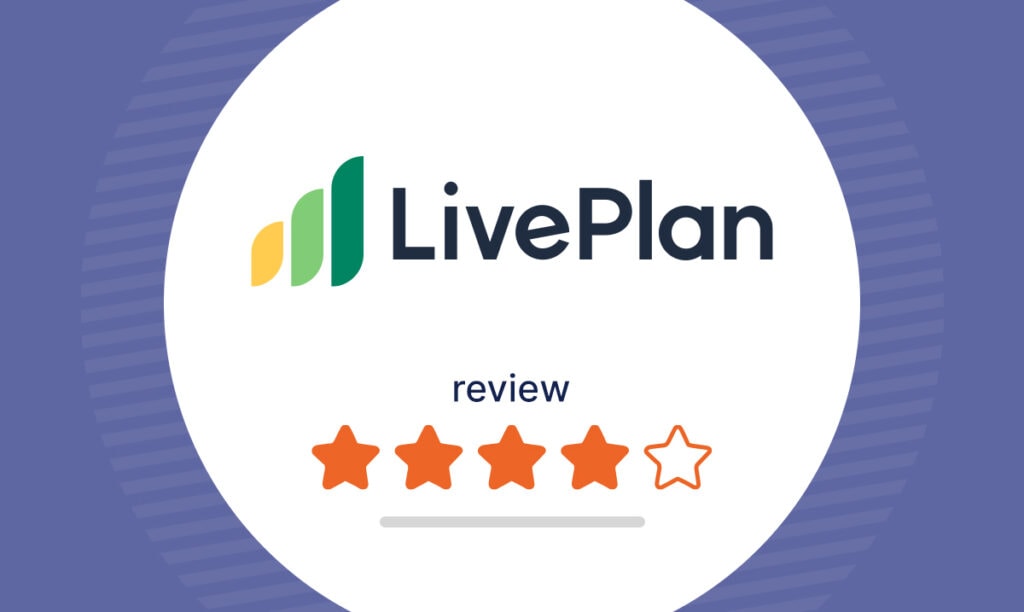
LivePlan Software Review: Features, Cost, Pros & Cons
Published on September 15, 2023
When you’re starting a business, a business plan is essential whether you’re going to obtain financing or not. Creating a business plan helpsyou ...
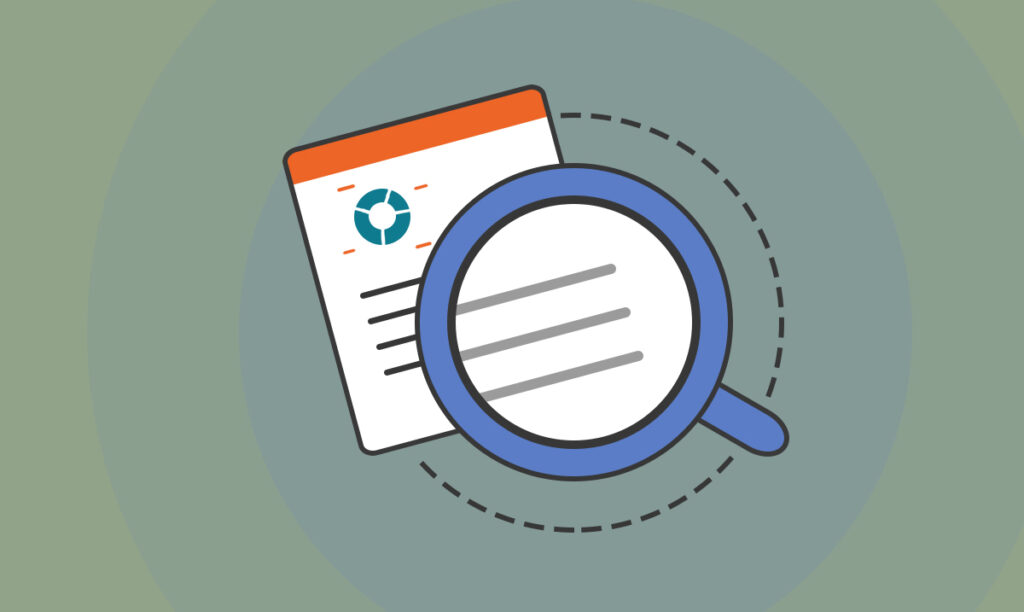
What to Include in Your Business Plan Appendix?
Published on September 13, 2023
Launching a business involves countless tasks, and one of the crucial early hurdles is writing a business plan. Many entrepreneurs who aren’tlooki ...
No thanks, I don't want to stay up to date on industry trends and news.
Small Business Trends
How to create a business plan: examples & free template.
Whether you’re a seasoned entrepreneur or launching your very first startup, the guide will give you the insights, tools, and confidence you need to create a solid foundation for your business.
Table of Contents
How to Write a Business Plan
Executive summary.
It’s crucial to include a clear mission statement, a brief description of your primary products or services, an overview of your target market, and key financial projections or achievements.
Our target market includes environmentally conscious consumers and businesses seeking to reduce their carbon footprint. We project a 200% increase in revenue within the first three years of operation.
Overview and Business Objectives
Example: EcoTech’s primary objective is to become a market leader in sustainable technology products within the next five years. Our key objectives include:
Company Description
Example: EcoTech is committed to developing cutting-edge sustainable technology products that benefit both the environment and our customers. Our unique combination of innovative solutions and eco-friendly design sets us apart from the competition. We envision a future where technology and sustainability go hand in hand, leading to a greener planet.
Define Your Target Market
Market analysis.
The Market Analysis section requires thorough research and a keen understanding of the industry. It involves examining the current trends within your industry, understanding the needs and preferences of your customers, and analyzing the strengths and weaknesses of your competitors.
Our research indicates a gap in the market for high-quality, innovative eco-friendly technology products that cater to both individual and business clients.
SWOT Analysis
Including a SWOT analysis demonstrates to stakeholders that you have a balanced and realistic understanding of your business in its operational context.
Competitive Analysis
Organization and management team.
Provide an overview of your company’s organizational structure, including key roles and responsibilities. Introduce your management team, highlighting their expertise and experience to demonstrate that your team is capable of executing the business plan successfully.
Products and Services Offered
This section should emphasize the value you provide to customers, demonstrating that your business has a deep understanding of customer needs and is well-positioned to deliver innovative solutions that address those needs and set your company apart from competitors.
Marketing and Sales Strategy
Discuss how these marketing and sales efforts will work together to attract and retain customers, generate leads, and ultimately contribute to achieving your business’s revenue goals.
Logistics and Operations Plan
Inventory control is another crucial aspect, where you explain strategies for inventory management to ensure efficiency and reduce wastage. The section should also describe your production processes, emphasizing scalability and adaptability to meet changing market demands.
We also prioritize efficient distribution through various channels, including online platforms and retail partners, to deliver products to our customers in a timely manner.
Financial Projections Plan
This forward-looking financial plan is crucial for demonstrating that you have a firm grasp of the financial nuances of your business and are prepared to manage its financial health effectively.
Income Statement
Cash flow statement.
A cash flow statement is a crucial part of a financial business plan that shows the inflows and outflows of cash within your business. It helps you monitor your company’s liquidity, ensuring you have enough cash on hand to cover operating expenses, pay debts, and invest in growth opportunities.
| Section | Description | Example |
|---|---|---|
| Executive Summary | Brief overview of the business plan | Overview of EcoTech and its mission |
| Overview & Objectives | Outline of company's goals and strategies | Market leadership in sustainable technology |
| Company Description | Detailed explanation of the company and its unique selling proposition | EcoTech's history, mission, and vision |
| Target Market | Description of ideal customers and their needs | Environmentally conscious consumers and businesses |
| Market Analysis | Examination of industry trends, customer needs, and competitors | Trends in eco-friendly technology market |
| SWOT Analysis | Evaluation of Strengths, Weaknesses, Opportunities, and Threats | Strengths and weaknesses of EcoTech |
| Competitive Analysis | In-depth analysis of competitors and their strategies | Analysis of GreenTech and EarthSolutions |
| Organization & Management | Overview of the company's structure and management team | Key roles and team members at EcoTech |
| Products & Services | Description of offerings and their unique features | Energy-efficient lighting solutions, solar chargers |
| Marketing & Sales | Outline of marketing channels and sales strategies | Digital advertising, content marketing, influencer partnerships |
| Logistics & Operations | Details about daily operations, supply chain, inventory, and quality control | Partnerships with manufacturers, quality control |
| Financial Projections | Forecast of revenue, expenses, and profit for the next 3-5 years | Projected growth in revenue and net profit |
| Income Statement | Summary of company's revenues and expenses over a specified period | Revenue, Cost of Goods Sold, Gross Profit, Net Income |
| Cash Flow Statement | Overview of cash inflows and outflows within the business | Net Cash from Operating Activities, Investing Activities, Financing Activities |
Tips on Writing a Business Plan
4. Focus on your unique selling proposition (USP): Clearly articulate what sets your business apart from the competition. Emphasize your USP throughout your business plan to showcase your company’s value and potential for success.
FREE Business Plan Template
To help you get started on your business plan, we have created a template that includes all the essential components discussed in the “How to Write a Business Plan” section. This easy-to-use template will guide you through each step of the process, ensuring you don’t miss any critical details.
What is a Business Plan?
Why you should write a business plan.
Understanding the importance of a business plan in today’s competitive environment is crucial for entrepreneurs and business owners. Here are five compelling reasons to write a business plan:
What are the Different Types of Business Plans?
| Type of Business Plan | Purpose | Key Components | Target Audience |
|---|---|---|---|
| Startup Business Plan | Outlines the company's mission, objectives, target market, competition, marketing strategies, and financial projections. | Mission Statement, Company Description, Market Analysis, Competitive Analysis, Organizational Structure, Marketing and Sales Strategy, Financial Projections. | Entrepreneurs, Investors |
| Internal Business Plan | Serves as a management tool for guiding the company's growth, evaluating its progress, and ensuring that all departments are aligned with the overall vision. | Strategies, Milestones, Deadlines, Resource Allocation. | Internal Team Members |
| Strategic Business Plan | Outlines long-term goals and the steps to achieve them. | SWOT Analysis, Market Research, Competitive Analysis, Long-Term Goals. | Executives, Managers, Investors |
| Feasibility Business Plan | Assesses the viability of a business idea. | Market Demand, Competition, Financial Projections, Potential Obstacles. | Entrepreneurs, Investors |
| Growth Business Plan | Focuses on strategies for scaling up an existing business. | Market Analysis, New Product/Service Offerings, Financial Projections. | Business Owners, Investors |
| Operational Business Plan | Outlines the company's day-to-day operations. | Processes, Procedures, Organizational Structure. | Managers, Employees |
| Lean Business Plan | A simplified, agile version of a traditional plan, focusing on key elements. | Value Proposition, Customer Segments, Revenue Streams, Cost Structure. | Entrepreneurs, Startups |
| One-Page Business Plan | A concise summary of your company's key objectives, strategies, and milestones. | Key Objectives, Strategies, Milestones. | Entrepreneurs, Investors, Partners |
| Nonprofit Business Plan | Outlines the mission, goals, target audience, fundraising strategies, and budget allocation for nonprofit organizations. | Mission Statement, Goals, Target Audience, Fundraising Strategies, Budget. | Nonprofit Leaders, Board Members, Donors |
| Franchise Business Plan | Focuses on the franchisor's requirements, as well as the franchisee's goals, strategies, and financial projections. | Franchise Agreement, Brand Standards, Marketing Efforts, Operational Procedures, Financial Projections. | Franchisors, Franchisees, Investors |
Using Business Plan Software
Upmetrics provides a simple and intuitive platform for creating a well-structured business plan. It features customizable templates, financial forecasting tools, and collaboration capabilities, allowing you to work with team members and advisors. Upmetrics also offers a library of resources to guide you through the business planning process.
| Software | Key Features | User Interface | Additional Features |
|---|---|---|---|
| LivePlan | Over 500 sample plans, financial forecasting tools, progress tracking against KPIs | User-friendly, visually appealing | Allows creation of professional-looking business plans |
| Upmetrics | Customizable templates, financial forecasting tools, collaboration capabilities | Simple and intuitive | Provides a resource library for business planning |
| Bizplan | Drag-and-drop builder, modular sections, financial forecasting tools, progress tracking | Simple, visually engaging | Designed to simplify the business planning process |
| Enloop | Industry-specific templates, financial forecasting tools, automatic business plan generation, unique performance score | Robust, user-friendly | Offers a free version, making it accessible for businesses on a budget |
| Tarkenton GoSmallBiz | Guided business plan builder, customizable templates, financial projection tools | User-friendly | Offers CRM tools, legal document templates, and additional resources for small businesses |
Business Plan FAQs
What is a good business plan.
A good business plan is a well-researched, clear, and concise document that outlines a company’s goals, strategies, target market, competitive advantages, and financial projections. It should be adaptable to change and provide a roadmap for achieving success.
What are the 3 main purposes of a business plan?
Can i write a business plan by myself, is it possible to create a one-page business plan.
Yes, a one-page business plan is a condensed version that highlights the most essential elements, including the company’s mission, target market, unique selling proposition, and financial goals.
How long should a business plan be?
What is a business plan outline, what are the 5 most common business plan mistakes, what questions should be asked in a business plan.
A business plan should address questions such as: What problem does the business solve? Who is the specific target market ? What is the unique selling proposition? What are the company’s objectives? How will it achieve those objectives?
What’s the difference between a business plan and a strategic plan?
How is business planning for a nonprofit different.

- Business Guides
- Digital Marketing Guides
- How To Guides
- Human Resource Guides
- Hustle Guides
- Marketing & Sales Guides
- Startup Guides
- Brand Competitors
- Brand Failure
- Brand History
- Brand Statistics
- Business Models
- Business Strategies
- Startup Essentials
- Marketing Essentials
- Branding Essentials
- Management Essentials
- Crypto Essentials
- Development Essentials
- Product Management
- Project Management
- Sales Essentials
- Software Reviews
- Startup Discovery – Noteworthy Startups
- Startup Ideas
- Startup Process
- Startup Resources
- Startup Courses
- AI Prompt Generator
- Business Idea Generator
- Startup Cost Calculator
- Slogan Generator (AI-Powered)
- ChatGPT Prompt Generator
- Midjourney Prompt Generator
- Stable Diffusion Prompt Generator
- Elevator Pitch Generator
- Free Startup Ideas
🤖 Free Business Plan Generator (AI-Powered)
Starting a business is an exciting journey, filled with aspirations and ambitions, yet crafting a solid business plan can sometimes feel like navigating through a dense fog. The AI-Powered Business Plan Generator shines a light on this path, offering a straightforward way to outline your vision, strategies, and financial forecasts. By providing customized, coherent business plans, this tool assists in laying down the foundation of your entrepreneurial dream, ensuring every aspect is addressed. It simplifies the planning process, enabling you to focus on bringing your business idea to life with confidence and clarity.
Writing a business plan can often feel like navigating through a dense forest without a map. You know your destination—securing investment, defining your business strategy, or setting clear objectives—but the path isn't always clear. Enter the AI-powered business plan generator, a tool designed to illuminate the way forward. This guide will walk you through the essentials of crafting a comprehensive business plan, touching upon the traditional elements that captivate stakeholders. In the final stretch, we'll introduce how an AI-powered business plan generator can streamline this process, making it more accessible and less time-consuming.
How to create a Business Plan
Now that you're familiar with the executive summary, let's tackle how you can create the rest of your business plan.
You can start manually by outlining your plan's structure and filling in the details step by step, or opt for a business plan generator to streamline the process.
Either method requires careful consideration of each section to ensure your plan is thorough and compelling.
Manual Methods for creating a Business Plan
You'll start with the Executive Summary, distilling your business idea into a compelling snapshot that captures attention.
Next, you'll outline your Company Overview, providing a clear picture of who you are and what you stand for.
Then, lay out your Business Objectives, Products and Services, and your Market Analysis Approach to build a solid foundation for your plan.
Executive Summary Essentials
Although it's often crafted last, the Executive Summary stands as the crucial opener of your business plan. It distills key aspects such as your mission, product highlights, and financial ambitions for quick investor insight. It encapsulates your company's essence for investors and maps out the business plan development milestones.
Ensure it crisply outlines your executive summary, underscoring the company's financial goals. This will help capture investors' attention right off the bat.
Company Overview
Begin your company overview by detailing your business's foundational elements, including its name, location, and the team driving its operations.
Here's what to include:
- A clear description of your business structure and ownership.
- The mission statement that defines your business's purpose.
- An outline of the products or services you offer.
- Background information that paints a picture of your company's history and objectives.
Business Objectives
To set your business on the path to success, start by defining clear and measurable objectives that reflect both your immediate and long-term aspirations.
Align your business objectives with strategic objectives to meet financial goals.
Conduct market research to fine-tune your target market strategies .
Ensure company goals are realistic and adaptable, setting a course for growth and market competitiveness.
Regular updates keep your plan relevant.
Products and Services
After setting clear business objectives, focus on articulating the core of your offering by detailing the products and services your business provides. Your description should also include:
- Unique features and benefits of each product or service.
- Specific products' competitive advantages.
- Your strategy for sales, distribution, and supply chain.
- Trademarks and market placement for your products and services.
Market Analysis Approach
A thorough market analysis is crucial for your business plan as it reveals the dynamics within your target market and guides your competitive strategy .
You'll identify potential customers, understand established market trends, and analyze how competitors differentiate themselves.
This knowledge shapes your sales plan and informs your marketing and sales efforts, highlighting opportunities in an otherwise crowded marketplace and showcasing your grasp of the competitive landscape.
Marketing and Sales Strategies
Crafting a marketing and sales strategy requires precise identification of your target customers to ensure your message resonates and spurs action. Here's how to proceed:
- Define your target market for the new product.
- Develop a pricing and sales channel approach.
- Design a marketing plan with promotional tactics.
- Analyze market trends to refine your strategy.
Stay focused on meeting customer needs and differentiating from competitors.
Financial Analysis and Projections
Diving into the financials, you'll need to gather historical data and conduct a thorough analysis of revenue streams , costs, and profit margins to inform your projections for the next three to five years.
Your financial plan hinges on these insights.
Operations Plan
To ensure your business runs like a well-oiled machine, start by mapping out your key operational processes and procedures. Your operations plan is a vital section of your business plan. Here's what to include:
- Outline technology's role in business operations.
- Develop a comprehensive staffing plan.
- Establish a robust inventory management system.
- Implement quality control measures to provide additional assurance of product or service excellence.
Funding Requirements
Having established the operational foundations of your business, let's now focus on determining the capital necessary to fuel your growth and operational needs.
Outline your funding requirements by presenting clear financial data, including projected income, balance sheets, and cash flows.
You'll need this to secure funding from venture capital firms or potential investors, ensuring they grasp how their capital will propel your business towards its targets.
Appendices and Exhibits
When crafting your business plan, don't overlook the appendices and exhibits; these sections provide the substantiating details that reinforce your proposal's integrity. Include:
Documents that outline key personnel qualifications and experience.
Details on intellectual property, such as patents.
Additional information for financial institutions, like credit histories.
Contracts, leases, or other legal documents relevant to your business.
Using a Business Plan Generator
You might wonder why you'd use a Business Plan Generator—these tools streamline the planning process, making it easier for you to focus on the core aspects of your strategy.
To get started, you'll follow a series of steps that help structure your executive summary, goals, and market analysis within a proven framework.
The benefits are clear: using a generator can save you time and provide you with a professional, investor-ready plan.
Steps to use the Business Plan Generator
To create a business plan using a generator, start by selecting a template that aligns with your industry and business type.
Here are the steps to use a business plan generator:
- Identify Your Business Details : Start by providing the name of your business and the industry it operates in. This foundational step sets the stage for the tailored guidance the generator can offer.
- Describe Your Offerings : Clearly articulate what products or services your business sells or offers. This will help the generator understand the value proposition of your business.
- Define Your Target Audience : Specify who your ideal customers are, including demographic information. Understanding your target audience is crucial for creating a focused and effective business plan.
- Outline Your Marketing Plan : Detail your strategies for promoting your business. This includes how you plan to reach your target audience and differentiate yourself from competitors.
- Detail Your Operational Strategy : Explain how your business will operate on a day-to-day basis. Include information on your supply chain, logistics, and any other operational details.
- Provide Financial Information : Input how much money you need to start your business and project how much revenue it will generate. This financial planning is critical for assessing the feasibility of your business idea.
- Set Business Objectives : List what you aim to achieve with your business in the short term and the long term. These goals will guide the direction of your business strategy.
- Click on Generate : After entering all the necessary information, click the "generate" button to create your personalised business plan. This plan will be tailored to the specifics of your business, providing a roadmap for success.
Benefits of using a Business Plan Generator
Harnessing a business plan generator can significantly streamline the process, saving you both time and effort as you craft a detailed blueprint for your venture.
Here are the benefits:
- Provides a structured framework to write a business plan efficiently.
- Helps identify opportunities in new markets.
- Enhances financial literacy through budgeting and forecasting tools.
- Clarifies business objectives, aiding in communication with stakeholders.
Tips for Creating a Business Plan
When crafting your business plan these tips collectively form a comprehensive business plan, providing a roadmap for your business and presenting a compelling case to investors and lenders.
Here are the tips for creating a business plan:
- Articulate your mission and vision succinctly.
- Outline your offerings and financial ambitions.
- Provide a snapshot of your business's financial health and market potential.
- Clarify the business structure ( sole proprietorship , partnership, corporation).
- Highlight ownership details.
- Showcase key employees, emphasizing their expertise.
- Define short- and long-term goals for your business.
- Align goals with your strategic direction.
- Establish a direct link between financing needs and future growth.
- Describe your offerings and emphasize how they meet market needs.
- Support claims with market research.
- Demonstrate a thorough understanding of your competition.
Get 3 New Researched Business Ideas Every Wednesday
Along with other startup-oriented knowledge.

How to Write a Business Plan: Step-by-Step Guide + Examples

Noah Parsons
24 min. read
Updated May 7, 2024
Writing a business plan doesn’t have to be complicated.
In this step-by-step guide, you’ll learn how to write a business plan that’s detailed enough to impress bankers and potential investors, while giving you the tools to start, run, and grow a successful business.
- The basics of business planning
If you’re reading this guide, then you already know why you need a business plan .
You understand that planning helps you:
- Raise money
- Grow strategically
- Keep your business on the right track
As you start to write your plan, it’s useful to zoom out and remember what a business plan is .
At its core, a business plan is an overview of the products and services you sell, and the customers that you sell to. It explains your business strategy: how you’re going to build and grow your business, what your marketing strategy is, and who your competitors are.
Most business plans also include financial forecasts for the future. These set sales goals, budget for expenses, and predict profits and cash flow.
A good business plan is much more than just a document that you write once and forget about. It’s also a guide that helps you outline and achieve your goals.
After completing your plan, you can use it as a management tool to track your progress toward your goals. Updating and adjusting your forecasts and budgets as you go is one of the most important steps you can take to run a healthier, smarter business.
We’ll dive into how to use your plan later in this article.
There are many different types of plans , but we’ll go over the most common type here, which includes everything you need for an investor-ready plan. However, if you’re just starting out and are looking for something simpler—I recommend starting with a one-page business plan . It’s faster and easier to create.
It’s also the perfect place to start if you’re just figuring out your idea, or need a simple strategic plan to use inside your business.
Dig deeper : How to write a one-page business plan
Brought to you by
Create a professional business plan
Using ai and step-by-step instructions.
Secure funding
Validate ideas
Build a strategy
- What to include in your business plan
Executive summary
The executive summary is an overview of your business and your plans. It comes first in your plan and is ideally just one to two pages. Most people write it last because it’s a summary of the complete business plan.
Ideally, the executive summary can act as a stand-alone document that covers the highlights of your detailed plan.
In fact, it’s common for investors to ask only for the executive summary when evaluating your business. If they like what they see in the executive summary, they’ll often follow up with a request for a complete plan, a pitch presentation , or more in-depth financial forecasts .
Your executive summary should include:
- A summary of the problem you are solving
- A description of your product or service
- An overview of your target market
- A brief description of your team
- A summary of your financials
- Your funding requirements (if you are raising money)
Dig Deeper: How to write an effective executive summary
Products and services description
This is where you describe exactly what you’re selling, and how it solves a problem for your target market. The best way to organize this part of your plan is to start by describing the problem that exists for your customers. After that, you can describe how you plan to solve that problem with your product or service.
This is usually called a problem and solution statement .
To truly showcase the value of your products and services, you need to craft a compelling narrative around your offerings. How will your product or service transform your customers’ lives or jobs? A strong narrative will draw in your readers.
This is also the part of the business plan to discuss any competitive advantages you may have, like specific intellectual property or patents that protect your product. If you have any initial sales, contracts, or other evidence that your product or service is likely to sell, include that information as well. It will show that your idea has traction , which can help convince readers that your plan has a high chance of success.
Market analysis
Your target market is a description of the type of people that you plan to sell to. You might even have multiple target markets, depending on your business.
A market analysis is the part of your plan where you bring together all of the information you know about your target market. Basically, it’s a thorough description of who your customers are and why they need what you’re selling. You’ll also include information about the growth of your market and your industry .
Try to be as specific as possible when you describe your market.
Include information such as age, income level, and location—these are what’s called “demographics.” If you can, also describe your market’s interests and habits as they relate to your business—these are “psychographics.”
Related: Target market examples
Essentially, you want to include any knowledge you have about your customers that is relevant to how your product or service is right for them. With a solid target market, it will be easier to create a sales and marketing plan that will reach your customers. That’s because you know who they are, what they like to do, and the best ways to reach them.
Next, provide any additional information you have about your market.
What is the size of your market ? Is the market growing or shrinking? Ideally, you’ll want to demonstrate that your market is growing over time, and also explain how your business is positioned to take advantage of any expected changes in your industry.
Dig Deeper: Learn how to write a market analysis
Competitive analysis
Part of defining your business opportunity is determining what your competitive advantage is. To do this effectively, you need to know as much about your competitors as your target customers.
Every business has some form of competition. If you don’t think you have competitors, then explore what alternatives there are in the market for your product or service.
For example: In the early years of cars, their main competition was horses. For social media, the early competition was reading books, watching TV, and talking on the phone.
A good competitive analysis fully lays out the competitive landscape and then explains how your business is different. Maybe your products are better made, or cheaper, or your customer service is superior. Maybe your competitive advantage is your location – a wide variety of factors can ultimately give you an advantage.
Dig Deeper: How to write a competitive analysis for your business plan
Marketing and sales plan
The marketing and sales plan covers how you will position your product or service in the market, the marketing channels and messaging you will use, and your sales tactics.
The best place to start with a marketing plan is with a positioning statement .
This explains how your business fits into the overall market, and how you will explain the advantages of your product or service to customers. You’ll use the information from your competitive analysis to help you with your positioning.
For example: You might position your company as the premium, most expensive but the highest quality option in the market. Or your positioning might focus on being locally owned and that shoppers support the local economy by buying your products.
Once you understand your positioning, you’ll bring this together with the information about your target market to create your marketing strategy .
This is how you plan to communicate your message to potential customers. Depending on who your customers are and how they purchase products like yours, you might use many different strategies, from social media advertising to creating a podcast. Your marketing plan is all about how your customers discover who you are and why they should consider your products and services.
While your marketing plan is about reaching your customers—your sales plan will describe the actual sales process once a customer has decided that they’re interested in what you have to offer.
If your business requires salespeople and a long sales process, describe that in this section. If your customers can “self-serve” and just make purchases quickly on your website, describe that process.
A good sales plan picks up where your marketing plan leaves off. The marketing plan brings customers in the door and the sales plan is how you close the deal.
Together, these specific plans paint a picture of how you will connect with your target audience, and how you will turn them into paying customers.
Dig deeper: What to include in your sales and marketing plan
Business operations
The operations section describes the necessary requirements for your business to run smoothly. It’s where you talk about how your business works and what day-to-day operations look like.
Depending on how your business is structured, your operations plan may include elements of the business like:
- Supply chain management
- Manufacturing processes
- Equipment and technology
- Distribution
Some businesses distribute their products and reach their customers through large retailers like Amazon.com, Walmart, Target, and grocery store chains.
These businesses should review how this part of their business works. The plan should discuss the logistics and costs of getting products onto store shelves and any potential hurdles the business may have to overcome.
If your business is much simpler than this, that’s OK. This section of your business plan can be either extremely short or more detailed, depending on the type of business you are building.
For businesses selling services, such as physical therapy or online software, you can use this section to describe the technology you’ll leverage, what goes into your service, and who you will partner with to deliver your services.
Dig Deeper: Learn how to write the operations chapter of your plan
Key milestones and metrics
Although it’s not required to complete your business plan, mapping out key business milestones and the metrics can be incredibly useful for measuring your success.
Good milestones clearly lay out the parameters of the task and set expectations for their execution. You’ll want to include:
- A description of each task
- The proposed due date
- Who is responsible for each task
If you have a budget, you can include projected costs to hit each milestone. You don’t need extensive project planning in this section—just list key milestones you want to hit and when you plan to hit them. This is your overall business roadmap.
Possible milestones might be:
- Website launch date
- Store or office opening date
- First significant sales
- Break even date
- Business licenses and approvals
You should also discuss the key numbers you will track to determine your success. Some common metrics worth tracking include:
- Conversion rates
- Customer acquisition costs
- Profit per customer
- Repeat purchases
It’s perfectly fine to start with just a few metrics and grow the number you are tracking over time. You also may find that some metrics simply aren’t relevant to your business and can narrow down what you’re tracking.
Dig Deeper: How to use milestones in your business plan
Organization and management team
Investors don’t just look for great ideas—they want to find great teams. Use this chapter to describe your current team and who you need to hire . You should also provide a quick overview of your location and history if you’re already up and running.
Briefly highlight the relevant experiences of each key team member in the company. It’s important to make the case for why yours is the right team to turn an idea into a reality.
Do they have the right industry experience and background? Have members of the team had entrepreneurial successes before?
If you still need to hire key team members, that’s OK. Just note those gaps in this section.
Your company overview should also include a summary of your company’s current business structure . The most common business structures include:
- Sole proprietor
- Partnership
Be sure to provide an overview of how the business is owned as well. Does each business partner own an equal portion of the business? How is ownership divided?
Potential lenders and investors will want to know the structure of the business before they will consider a loan or investment.
Dig Deeper: How to write about your company structure and team
Financial plan
Last, but certainly not least, is your financial plan chapter.
Entrepreneurs often find this section the most daunting. But, business financials for most startups are less complicated than you think, and a business degree is certainly not required to build a solid financial forecast.
A typical financial forecast in a business plan includes the following:
- Sales forecast : An estimate of the sales expected over a given period. You’ll break down your forecast into the key revenue streams that you expect to have.
- Expense budget : Your planned spending such as personnel costs , marketing expenses, and taxes.
- Profit & Loss : Brings together your sales and expenses and helps you calculate planned profits.
- Cash Flow : Shows how cash moves into and out of your business. It can predict how much cash you’ll have on hand at any given point in the future.
- Balance Sheet : A list of the assets, liabilities, and equity in your company. In short, it provides an overview of the financial health of your business.
A strong business plan will include a description of assumptions about the future, and potential risks that could impact the financial plan. Including those will be especially important if you’re writing a business plan to pursue a loan or other investment.
Dig Deeper: How to create financial forecasts and budgets
This is the place for additional data, charts, or other information that supports your plan.
Including an appendix can significantly enhance the credibility of your plan by showing readers that you’ve thoroughly considered the details of your business idea, and are backing your ideas up with solid data.
Just remember that the information in the appendix is meant to be supplementary. Your business plan should stand on its own, even if the reader skips this section.
Dig Deeper : What to include in your business plan appendix
Optional: Business plan cover page
Adding a business plan cover page can make your plan, and by extension your business, seem more professional in the eyes of potential investors, lenders, and partners. It serves as the introduction to your document and provides necessary contact information for stakeholders to reference.
Your cover page should be simple and include:
- Company logo
- Business name
- Value proposition (optional)
- Business plan title
- Completion and/or update date
- Address and contact information
- Confidentiality statement
Just remember, the cover page is optional. If you decide to include it, keep it very simple and only spend a short amount of time putting it together.
Dig Deeper: How to create a business plan cover page
How to use AI to help write your business plan
Generative AI tools such as ChatGPT can speed up the business plan writing process and help you think through concepts like market segmentation and competition. These tools are especially useful for taking ideas that you provide and converting them into polished text for your business plan.
The best way to use AI for your business plan is to leverage it as a collaborator , not a replacement for human creative thinking and ingenuity.
AI can come up with lots of ideas and act as a brainstorming partner. It’s up to you to filter through those ideas and figure out which ones are realistic enough to resonate with your customers.
There are pros and cons of using AI to help with your business plan . So, spend some time understanding how it can be most helpful before just outsourcing the job to AI.
Learn more: 10 AI prompts you need to write a business plan
- Writing tips and strategies
To help streamline the business plan writing process, here are a few tips and key questions to answer to make sure you get the most out of your plan and avoid common mistakes .
Determine why you are writing a business plan
Knowing why you are writing a business plan will determine your approach to your planning project.
For example: If you are writing a business plan for yourself, or just to use inside your own business , you can probably skip the section about your team and organizational structure.
If you’re raising money, you’ll want to spend more time explaining why you’re looking to raise the funds and exactly how you will use them.
Regardless of how you intend to use your business plan , think about why you are writing and what you’re trying to get out of the process before you begin.
Keep things concise
Probably the most important tip is to keep your business plan short and simple. There are no prizes for long business plans . The longer your plan is, the less likely people are to read it.
So focus on trimming things down to the essentials your readers need to know. Skip the extended, wordy descriptions and instead focus on creating a plan that is easy to read —using bullets and short sentences whenever possible.
Have someone review your business plan
Writing a business plan in a vacuum is never a good idea. Sometimes it’s helpful to zoom out and check if your plan makes sense to someone else. You also want to make sure that it’s easy to read and understand.
Don’t wait until your plan is “done” to get a second look. Start sharing your plan early, and find out from readers what questions your plan leaves unanswered. This early review cycle will help you spot shortcomings in your plan and address them quickly, rather than finding out about them right before you present your plan to a lender or investor.
If you need a more detailed review, you may want to explore hiring a professional plan writer to thoroughly examine it.
Use a free business plan template and business plan examples to get started
Knowing what information to include in a business plan is sometimes not quite enough. If you’re struggling to get started or need additional guidance, it may be worth using a business plan template.
There are plenty of great options available (we’ve rounded up our 8 favorites to streamline your search).
But, if you’re looking for a free downloadable business plan template , you can get one right now; download the template used by more than 1 million businesses.
Or, if you just want to see what a completed business plan looks like, check out our library of over 550 free business plan examples .
We even have a growing list of industry business planning guides with tips for what to focus on depending on your business type.
Common pitfalls and how to avoid them
It’s easy to make mistakes when you’re writing your business plan. Some entrepreneurs get sucked into the writing and research process, and don’t focus enough on actually getting their business started.
Here are a few common mistakes and how to avoid them:
Not talking to your customers : This is one of the most common mistakes. It’s easy to assume that your product or service is something that people want. Before you invest too much in your business and too much in the planning process, make sure you talk to your prospective customers and have a good understanding of their needs.
- Overly optimistic sales and profit forecasts: By nature, entrepreneurs are optimistic about the future. But it’s good to temper that optimism a little when you’re planning, and make sure your forecasts are grounded in reality.
- Spending too much time planning: Yes, planning is crucial. But you also need to get out and talk to customers, build prototypes of your product and figure out if there’s a market for your idea. Make sure to balance planning with building.
- Not revising the plan: Planning is useful, but nothing ever goes exactly as planned. As you learn more about what’s working and what’s not—revise your plan, your budgets, and your revenue forecast. Doing so will provide a more realistic picture of where your business is going, and what your financial needs will be moving forward.
- Not using the plan to manage your business: A good business plan is a management tool. Don’t just write it and put it on the shelf to collect dust – use it to track your progress and help you reach your goals.
- Presenting your business plan
The planning process forces you to think through every aspect of your business and answer questions that you may not have thought of. That’s the real benefit of writing a business plan – the knowledge you gain about your business that you may not have been able to discover otherwise.
With all of this knowledge, you’re well prepared to convert your business plan into a pitch presentation to present your ideas.
A pitch presentation is a summary of your plan, just hitting the highlights and key points. It’s the best way to present your business plan to investors and team members.
Dig Deeper: Learn what key slides should be included in your pitch deck
Use your business plan to manage your business
One of the biggest benefits of planning is that it gives you a tool to manage your business better. With a revenue forecast, expense budget, and projected cash flow, you know your targets and where you are headed.
And yet, nothing ever goes exactly as planned – it’s the nature of business.
That’s where using your plan as a management tool comes in. The key to leveraging it for your business is to review it periodically and compare your forecasts and projections to your actual results.
Start by setting up a regular time to review the plan – a monthly review is a good starting point. During this review, answer questions like:
- Did you meet your sales goals?
- Is spending following your budget?
- Has anything gone differently than what you expected?
Now that you see whether you’re meeting your goals or are off track, you can make adjustments and set new targets.
Maybe you’re exceeding your sales goals and should set new, more aggressive goals. In that case, maybe you should also explore more spending or hiring more employees.
Or maybe expenses are rising faster than you projected. If that’s the case, you would need to look at where you can cut costs.
A plan, and a method for comparing your plan to your actual results , is the tool you need to steer your business toward success.
Learn More: How to run a regular plan review
Free business plan templates and examples
Kickstart your business plan writing with one of our free business plan templates or recommended tools.

Free business plan template
Download a free SBA-approved business plan template built for small businesses and startups.
Download Template

One-page plan template
Download a free one-page plan template to write a useful business plan in as little as 30-minutes.

Sample business plan library
Explore over 500 real-world business plan examples from a wide variety of industries.
View Sample Plans
How to write a business plan FAQ
What is a business plan?
A document that describes your business , the products and services you sell, and the customers that you sell to. It explains your business strategy, how you’re going to build and grow your business, what your marketing strategy is, and who your competitors are.
What are the benefits of a business plan?
A business plan helps you understand where you want to go with your business and what it will take to get there. It reduces your overall risk, helps you uncover your business’s potential, attracts investors, and identifies areas for growth.
Having a business plan ultimately makes you more confident as a business owner and more likely to succeed for a longer period of time.
What are the 7 steps of a business plan?
The seven steps to writing a business plan include:
- Write a brief executive summary
- Describe your products and services.
- Conduct market research and compile data into a cohesive market analysis.
- Describe your marketing and sales strategy.
- Outline your organizational structure and management team.
- Develop financial projections for sales, revenue, and cash flow.
- Add any additional documents to your appendix.
What are the 5 most common business plan mistakes?
There are plenty of mistakes that can be made when writing a business plan. However, these are the 5 most common that you should do your best to avoid:
- 1. Not taking the planning process seriously.
- Having unrealistic financial projections or incomplete financial information.
- Inconsistent information or simple mistakes.
- Failing to establish a sound business model.
- Not having a defined purpose for your business plan.
What questions should be answered in a business plan?
Writing a business plan is all about asking yourself questions about your business and being able to answer them through the planning process. You’ll likely be asking dozens and dozens of questions for each section of your plan.
However, these are the key questions you should ask and answer with your business plan:
- How will your business make money?
- Is there a need for your product or service?
- Who are your customers?
- How are you different from the competition?
- How will you reach your customers?
- How will you measure success?
How long should a business plan be?
The length of your business plan fully depends on what you intend to do with it. From the SBA and traditional lender point of view, a business plan needs to be whatever length necessary to fully explain your business. This means that you prove the viability of your business, show that you understand the market, and have a detailed strategy in place.
If you intend to use your business plan for internal management purposes, you don’t necessarily need a full 25-50 page business plan. Instead, you can start with a one-page plan to get all of the necessary information in place.
What are the different types of business plans?
While all business plans cover similar categories, the style and function fully depend on how you intend to use your plan. Here are a few common business plan types worth considering.
Traditional business plan: The tried-and-true traditional business plan is a formal document meant to be used when applying for funding or pitching to investors. This type of business plan follows the outline above and can be anywhere from 10-50 pages depending on the amount of detail included, the complexity of your business, and what you include in your appendix.
Business model canvas: The business model canvas is a one-page template designed to demystify the business planning process. It removes the need for a traditional, copy-heavy business plan, in favor of a single-page outline that can help you and outside parties better explore your business idea.
One-page business plan: This format is a simplified version of the traditional plan that focuses on the core aspects of your business. You’ll typically stick with bullet points and single sentences. It’s most useful for those exploring ideas, needing to validate their business model, or who need an internal plan to help them run and manage their business.
Lean Plan: The Lean Plan is less of a specific document type and more of a methodology. It takes the simplicity and styling of the one-page business plan and turns it into a process for you to continuously plan, test, review, refine, and take action based on performance. It’s faster, keeps your plan concise, and ensures that your plan is always up-to-date.
What’s the difference between a business plan and a strategic plan?
A business plan covers the “who” and “what” of your business. It explains what your business is doing right now and how it functions. The strategic plan explores long-term goals and explains “how” the business will get there. It encourages you to look more intently toward the future and how you will achieve your vision.
However, when approached correctly, your business plan can actually function as a strategic plan as well. If kept lean, you can define your business, outline strategic steps, and track ongoing operations all with a single plan.
Noah is the COO at Palo Alto Software, makers of the online business plan app LivePlan. He started his career at Yahoo! and then helped start the user review site Epinions.com. From there he started a software distribution business in the UK before coming to Palo Alto Software to run the marketing and product teams.

Table of Contents
- Use AI to help write your plan
- Common planning mistakes
- Manage with your business plan
- Templates and examples
Related Articles

3 Min. Read
What to Include in Your Business Plan Appendix

1 Min. Read
How to Calculate Return on Investment (ROI)

7 Min. Read
How to Write a Bakery Business Plan + Sample

5 Min. Read
How To Write a Business Plan for a Life Coaching Business + Free Example
The Bplans Newsletter
The Bplans Weekly
Subscribe now for weekly advice and free downloadable resources to help start and grow your business.
We care about your privacy. See our privacy policy .

The quickest way to turn a business idea into a business plan
Fill-in-the-blanks and automatic financials make it easy.
No thanks, I prefer writing 40-page documents.

Discover the world’s #1 plan building software
| You might be using an unsupported or outdated browser. To get the best possible experience please use the latest version of Chrome, Firefox, Safari, or Microsoft Edge to view this website. |
Simple Business Plan Template (2024)

Updated: May 4, 2024, 4:37pm

Table of Contents
Why business plans are vital, get your free simple business plan template, how to write an effective business plan in 6 steps, frequently asked questions.
While taking many forms and serving many purposes, they all have one thing in common: business plans help you establish your goals and define the means for achieving them. Our simple business plan template covers everything you need to consider when launching a side gig, solo operation or small business. By following this step-by-step process, you might even uncover a few alternate routes to success.
Featured Partners
ZenBusiness
$0 + State Fees
Varies By State & Package

On ZenBusiness' Website

On LegalZoom's Website
Northwest Registered Agent
$39 + State Fees

On Northwest Registered Agent's Website
$0 + State Fee
On Formations' Website
Whether you’re a first-time solopreneur or a seasoned business owner, the planning process challenges you to examine the costs and tasks involved in bringing a product or service to market. The process can also help you spot new income opportunities and hone in on the most profitable business models.
Though vital, business planning doesn’t have to be a chore. Business plans for lean startups and solopreneurs can simply outline the business concept, sales proposition, target customers and sketch out a plan of action to bring the product or service to market. However, if you’re seeking startup funding or partnership opportunities, you’ll need a write a business plan that details market research, operating costs and revenue forecasting. Whichever startup category you fall into, if you’re at square one, our simple business plan template will point you down the right path.
Copy our free simple business plan template so you can fill in the blanks as we explore each element of your business plan. Need help getting your ideas flowing? You’ll also find several startup scenario examples below.
Download free template as .docx
Whether you need a quick-launch overview or an in-depth plan for investors, any business plan should cover the six key elements outlined in our free template and explained below. The main difference in starting a small business versus an investor-funded business is the market research and operational and financial details needed to support the concept.
1. Your Mission or Vision
Start by declaring a “dream statement” for your business. You can call this your executive summary, vision statement or mission. Whatever the name, the first part of your business plan summarizes your idea by answering five questions. Keep it brief, such as an elevator pitch. You’ll expand these answers in the following sections of the simple business plan template.
- What does your business do? Are you selling products, services, information or a combination?
- Where does this happen? Will you conduct business online, in-store, via mobile means or in a specific location or environment?
- Who does your business benefit? Who is your target market and ideal customer for your concept?
- Why would potential customers care? What would make your ideal customers take notice of your business?
- How do your products and/or services outshine the competition? What would make your ideal customers choose you over a competitor?
These answers come easily if you have a solid concept for your business, but don’t worry if you get stuck. Use the rest of your plan template to brainstorm ideas and tactics. You’ll quickly find these answers and possibly new directions as you explore your ideas and options.
2. Offer and Value Proposition
This is where you detail your offer, such as selling products, providing services or both, and why anyone would care. That’s the value proposition. Specifically, you’ll expand on your answers to the first and fourth bullets from your mission/vision.
As you complete this section, you might find that exploring value propositions uncovers marketable business opportunities that you hadn’t yet considered. So spend some time brainstorming the possibilities in this section.
For example, a cottage baker startup specializing in gluten-free or keto-friendly products might be a value proposition that certain audiences care deeply about. Plus, you could expand on that value proposition by offering wedding and other special-occasion cakes that incorporate gluten-free, keto-friendly and traditional cake elements that all guests can enjoy.

3. Audience and Ideal Customer
Here is where you explore bullet point number three, who your business will benefit. Identifying your ideal customer and exploring a broader audience for your goods or services is essential in defining your sales and marketing strategies, plus it helps fine-tune what you offer.
There are many ways to research potential audiences, but a shortcut is to simply identify a problem that people have that your product or service can solve. If you start from the position of being a problem solver, it’s easy to define your audience and describe the wants and needs of your ideal customer for marketing efforts.
Using the cottage baker startup example, a problem people might have is finding fresh-baked gluten-free or keto-friendly sweets. Examining the wants and needs of these people might reveal a target audience that is health-conscious or possibly dealing with health issues and willing to spend more for hard-to-find items.
However, it’s essential to have a customer base that can support your business. You can be too specialized. For example, our baker startup can attract a broader audience and boost revenue by offering a wider selection of traditional baked goods alongside its gluten-free and keto-focused specialties.
4. Revenue Streams, Sales Channels and Marketing
Thanks to our internet-driven economy, startups have many revenue opportunities and can connect with target audiences through various channels. Revenue streams and sales channels also serve as marketing vehicles, so you can cover all three in this section.
Revenue Streams
Revenue streams are the many ways you can make money in your business. In your plan template, list how you’ll make money upon launch, plus include ideas for future expansion. The income possibilities just might surprise you.
For example, our cottage baker startup might consider these revenue streams:
- Product sales : Online, pop-up shops , wholesale and (future) in-store sales
- Affiliate income : Monetize blog and social media posts with affiliate links
- Advertising income : Reserve website space for advertising
- E-book sales : (future) Publish recipe e-books targeting gluten-free and keto-friendly dessert niches
- Video income : (future) Monetize a YouTube channel featuring how-to videos for the gluten-free and keto-friendly dessert niches
- Webinars and online classes : (future) Monetize coaching-style webinars and online classes covering specialty baking tips and techniques
- Members-only content : (future) Monetize a members-only section of the website for specialty content to complement webinars and online classes
- Franchise : (future) Monetize a specialty cottage bakery concept and sell to franchise entrepreneurs
Sales Channels
Sales channels put your revenue streams into action. This section also answers the “where will this happen” question in the second bullet of your vision.
The product sales channels for our cottage bakery example can include:
- Mobile point-of-sale (POS) : A mobile platform such as Shopify or Square POS for managing in-person sales at local farmers’ markets, fairs and festivals
- E-commerce platform : An online store such as Shopify, Square or WooCommerce for online retail sales and wholesale sales orders
- Social media channels : Facebook, Instagram and Pinterest shoppable posts and pins for online sales via social media channels
- Brick-and-mortar location : For in-store sales , once the business has grown to a point that it can support a physical location
Channels that support other income streams might include:
- Affiliate income : Blog section on the e-commerce website and affiliate partner accounts
- Advertising income : Reserved advertising spaces on the e-commerce website
- E-book sales : Amazon e-book sales via Amazon Kindle Direct Publishing
- Video income : YouTube channel with ad monetization
- Webinars and online classes : Online class and webinar platforms that support member accounts, recordings and playback
- Members-only content : Password-protected website content using membership apps such as MemberPress
Nowadays, the line between marketing and sales channels is blurred. Social media outlets, e-books, websites, blogs and videos serve as both marketing tools and income opportunities. Since most are free and those with advertising options are extremely economical, these are ideal marketing outlets for lean startups.
However, many businesses still find value in traditional advertising such as local radio, television, direct mail, newspapers and magazines. You can include these advertising costs in your simple business plan template to help build a marketing plan and budget.

5. Structure, Suppliers and Operations
This section of your simple business plan template explores how to structure and operate your business. Details include the type of business organization your startup will take, roles and responsibilities, supplier logistics and day-to-day operations. Also, include any certifications or permits needed to launch your enterprise in this section.
Our cottage baker example might use a structure and startup plan such as this:
- Business structure : Sole proprietorship with a “doing business as” (DBA) .
- Permits and certifications : County-issued food handling permit and state cottage food certification for home-based food production. Option, check into certified commercial kitchen rentals.
- Roles and responsibilities : Solopreneur, all roles and responsibilities with the owner.
- Supply chain : Bulk ingredients and food packaging via Sam’s Club, Costco, Amazon Prime with annual membership costs. Uline for shipping supplies; no membership needed.
- Day-to-day operations : Source ingredients and bake three days per week to fulfill local and online orders. Reserve time for specialty sales, wholesale partner orders and market events as needed. Ship online orders on alternating days. Update website and create marketing and affiliate blog posts on non-shipping days.
Start A Limited Liability Company Online Today with ZenBusiness
Click to get started.
6. Financial Forecasts
Your final task is to list forecasted business startup and ongoing costs and profit projections in your simple business plan template. Thanks to free business tools such as Square and free marketing on social media, lean startups can launch with few upfront costs. In many cases, cost of goods, shipping and packaging, business permits and printing for business cards are your only out-of-pocket expenses.
Cost Forecast
Our cottage baker’s forecasted lean startup costs might include:
| Business Need | Startup Cost | Ongoing Cost | Source |
|---|---|---|---|
Gross Profit Projections
This helps you determine the retail prices and sales volume required to keep your business running and, hopefully, earn income for yourself. Use product research to spot target retail prices for your goods, then subtract your cost of goods, such as hourly rate, raw goods and supplier costs. The total amount is your gross profit per item or service.
Here are some examples of projected gross profits for our cottage baker:
| Product | Retail Price | (Cost) | Gross Profit |
|---|---|---|---|
Bottom Line
Putting careful thought and detail in a business plan is always beneficial, but don’t get so bogged down in planning that you never hit the start button to launch your business . Also, remember that business plans aren’t set in stone. Markets, audiences and technologies change, and so will your goals and means of achieving them. Think of your business plan as a living document and regularly revisit, expand and restructure it as market opportunities and business growth demand.
Is there a template for a business plan?
You can copy our free business plan template and fill in the blanks or customize it in Google Docs, Microsoft Word or another word processing app. This free business plan template includes the six key elements that any entrepreneur needs to consider when launching a new business.
What does a simple business plan include?
A simple business plan is a one- to two-page overview covering six key elements that any budding entrepreneur needs to consider when launching a startup. These include your vision or mission, product or service offering, target audience, revenue streams and sales channels, structure and operations, and financial forecasts.
How can I create a free business plan template?
Start with our free business plan template that covers the six essential elements of a startup. Once downloaded, you can edit this document in Google Docs or another word processing app and add new sections or subsections to your plan template to meet your specific business plan needs.
What basic items should be included in a business plan?
When writing out a business plan, you want to make sure that you cover everything related to your concept for the business, an analysis of the industry―including potential customers and an overview of the market for your goods or services―how you plan to execute your vision for the business, how you plan to grow the business if it becomes successful and all financial data around the business, including current cash on hand, potential investors and budget plans for the next few years.
- Best LLC Services
- Best Registered Agent Services
- Best Trademark Registration Services
- Top LegalZoom Competitors
- Best Business Loans
- Best Business Plan Software
- ZenBusiness Review
- LegalZoom LLC Review
- Northwest Registered Agent Review
- Rocket Lawyer Review
- Inc. Authority Review
- Rocket Lawyer vs. LegalZoom
- Bizee Review (Formerly Incfile)
- Swyft Filings Review
- Harbor Compliance Review
- Sole Proprietorship vs. LLC
- LLC vs. Corporation
- LLC vs. S Corp
- LLP vs. LLC
- DBA vs. LLC
- LegalZoom vs. Incfile
- LegalZoom vs. ZenBusiness
- LegalZoom vs. Rocket Lawyer
- ZenBusiness vs. Incfile
- How To Start A Business
- How to Set Up an LLC
- How to Get a Business License
- LLC Operating Agreement Template
- 501(c)(3) Application Guide
- What is a Business License?
- What is an LLC?
- What is an S Corp?
- What is a C Corp?
- What is a DBA?
- What is a Sole Proprietorship?
- What is a Registered Agent?
- How to Dissolve an LLC
- How to File a DBA
- What Are Articles Of Incorporation?
- Types Of Business Ownership
Next Up In Company Formation
- Best Online Legal Services
- How To Write A Business Plan
- Member-Managed LLC Vs. Manager-Managed LLC
- Starting An S-Corp
- LLC Vs. C-Corp
- How Much Does It Cost To Start An LLC?

Best West Virginia Registered Agent Services Of 2024
Best Vermont Registered Agent Services Of 2024

Best Rhode Island Registered Agent Services Of 2024

Best Wisconsin Registered Agent Services Of 2024

Best South Dakota Registered Agent Services Of 2024

B2B Marketing In 2024: The Ultimate Guide
Krista Fabregas is a seasoned eCommerce and online content pro sharing more than 20 years of hands-on know-how with those looking to launch and grow tech-forward businesses. Her expertise includes eCommerce startups and growth, SMB operations and logistics, website platforms, payment systems, side-gig and affiliate income, and multichannel marketing. Krista holds a bachelor's degree in English from The University of Texas at Austin and held senior positions at NASA, a Fortune 100 company, and several online startups.

IMAGES
VIDEO
COMMENTS
Forbes Advisor analyzed dozens of the leading solutions to find the best business plan software based on features, price, ease of use and more.
In our review, we compare the best business plan software for startups based on pricing, features, and more to help you become investor-ready in 2024.
Writing a business plan can be critical to a small business achieving success. Business.org reviews the best business plan tools and software.
Access our list of top business plan tools. Learn about benefits of business plan software, what types there are, pricing, reviews, and what sets each apart.
For startups, business plan software guides them through the crucial early stages with comprehensive business plan templates and financial modeling tools. Established businesses on the other hand benefit from the software's collaborative features, enabling seamless teamwork as they pivot, innovate and pursue new growth opportunities.
Compare the best business plan software options and learn everything you need to know to pick the right software for your small business planning needs.
Other standout features include drag-and-drop tools for creating business plan templates, access to self-guided business courses from Startups.com, and financial tools to help set salaries, forecast revenue, and track expenses.
Unlock access to Startups Unlimited. $ 29 /mo. Create, collaborate, and share your business plan with investors and potential customers.
A good business plan helps you identify your mission and your value proposition. We test top business plan creation tools that help you build and track your organization's future.
Building a business is hard work and you need digital solutions that can make everyday life easier as an early-stage founder. Cuttles is a guided and personalized startup builder that helps you with planning, budgeting, and presenting your startup to investors. Their business plan tool helps you write your plan in a fraction of the time.
The tool provides a variety of business plan templates and financial forecasting tools, making it suitable for a broad spectrum of startups, from restaurants to large enterprises and venture capital initiatives.
Looking for the best business plan software? This guide has listed down the top 10 business plan tools, including their top features, pricing, and reviews.
To simplify the creation of a robust business plan as an entrepreneur, you can harness the power of a business plan maker. This invaluable tool streamlines the process and ensures a polished and well-organized presentation. Startup business plan templates provide pre-designed frameworks that can be customized to suit your specific industry needs, saving valuable time and effort while ...
This article will explore ten of the best business planning tools for startups. The list includes Enloop, LivePlan, IdeasBuddy, etc.
Explore the top business plan software options in our comprehensive review, helping you choose the ideal tool for your startup or established business needs.
Craft a winning business plan with this guide: essential insights and tools for entrepreneurs, setting a robust foundation for your venture.
A good business plan guides you through each stage of starting and managing your business. You'll use your business plan as a roadmap for how to structure, run, and grow your new business. It's a way to think through the key elements of your business.
Business Plan Generator streamlines the creation of a professional business plan, making it an efficient tool for entrepreneurs and managers.
A list of the best startup tools that are free or low-cost. From marketing to funding, these startup resources will help you reach success in 2024.
If you want inspiration for your business plan, consider taking a deep look at these examples to help create a successful plan for your business.
In this step-by-step guide, you'll learn how to write a business plan that's detailed enough to impress bankers and potential investors, while giving you the tools to start, run, and grow a successful business.
Add these startup tools to your tech stack to run your business smarter and grow faster.
This section of your simple business plan template explores how to structure and operate your business. Details include the type of business organization your startup will take, roles and ...